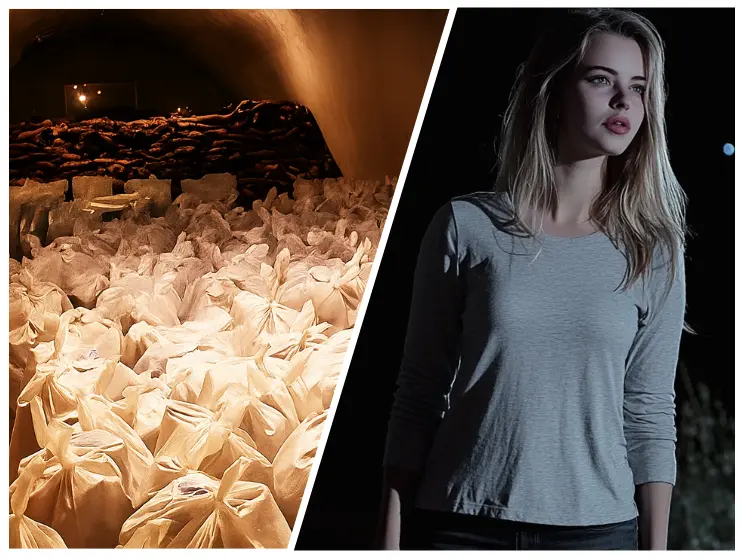The barn wasn’t a gift. It was a joke—one last insult wrapped in weathered wood and rotting beams. While her brothers squabbled over real estate and bank accounts, Claire stood alone at the edge of the field, staring at the sagging roof she now owned. Her inheritance? Dust and silence.
They laughed when she told them she was cleaning it. Told her to dig through the junk and maybe she’d find something shiny. Bryan had the nerve to toast her with wine she hadn’t been offered. Sam just chuckled and said, “You got what you deserved.”
She hadn’t stayed for money. She gave up her job, her life, to care for the father they couldn’t be bothered to visit. And still, they saw her as less—less valuable, less deserving. But the barn held her father’s memory. And she wasn’t walking away.
Claire Whitmore hadn’t expected a thank you—let alone applause. But as she stood on the gravel drive of her childhood home, watching her brothers sip whiskey and laugh on the porch, a familiar tightness crept into her chest. The ache wasn’t new. Just louder now.
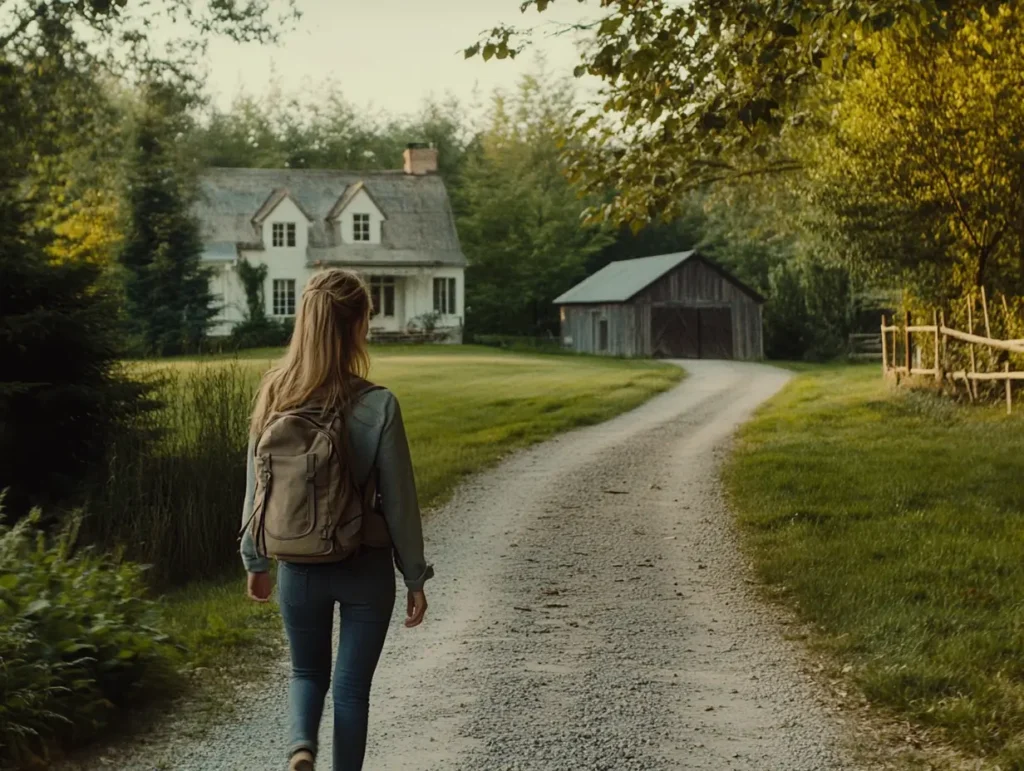
The funeral had ended hours ago. Guests had trickled out. Only family remained—what was left of it. The barn stood alone in the distance, weathered and leaning slightly, like it had been holding its breath for this day. Claire hadn’t been inside in over a decade.
“Dad left me the Jeep,” Sam said, raising his glass. “Still runs, shockingly. Needs a new starter, maybe, but she’s a beast.” “You’re welcome,” Claire muttered. “What?” he asked, cupping his ear. “Nothing.” She turned her gaze back to the barn.

The will had been brutally clear: Sam got the Jeep and the house. Bryan got the boat and a sizable cut of the savings. Claire got the barn. Just the barn. No one argued. Not because it was fair—but because it made sense to them. Claire had been the golden child. Daddy’s girl.
The one he doted on. The one who could do no wrong. So when she got the short end of the stick, neither of her brothers felt sorry. If anything, they saw it as a long-overdue balance. She’d dropped everything when their father got sick—left her job in Chicago, ended a relationship, and moved back into the home she once fought to escape.
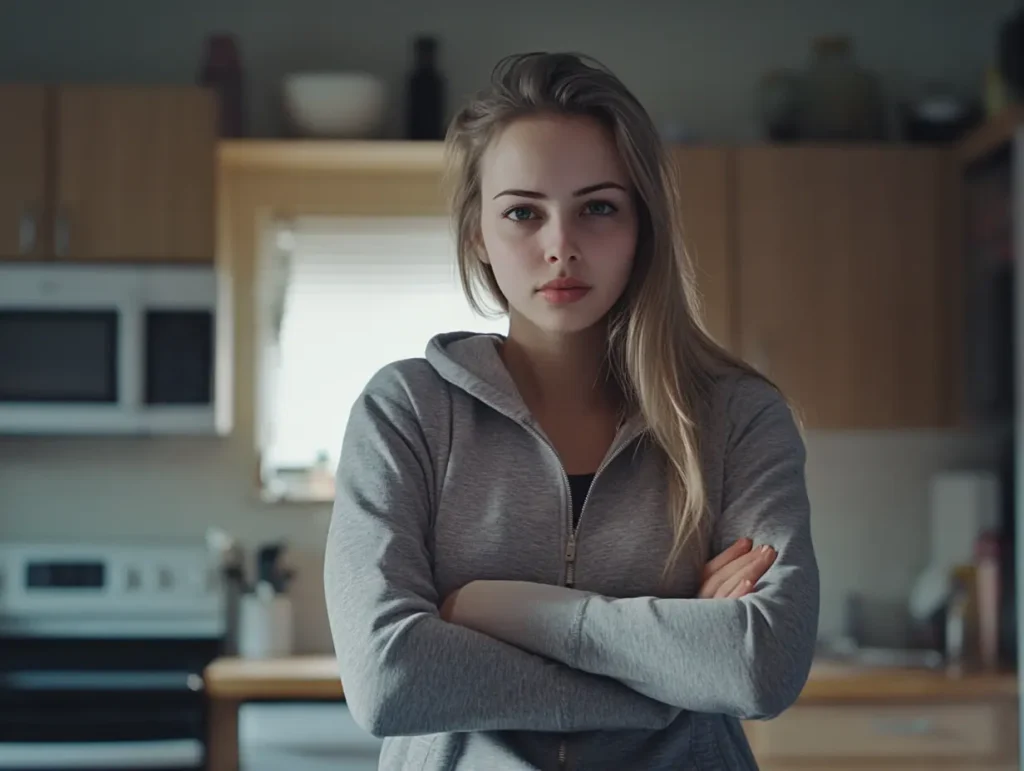
Not for inheritance. Not even for guilt. She came back because she loved him. Because when the doctors said “weeks, maybe months,” she couldn’t imagine him dying surrounded by strangers. It had been fourteen months.
She learned the names of every medication, how to lift him when he fell, how to soothe him when he called her by their mother’s name. She was there. And now, as her brothers joked about their inheritance, Claire felt like the last page in a forgotten book.

“I mean, hey,” Bryan said with a grin, “you got the barn. That’s… something.” Sam chuckled. “It’s full of dust, rat nests, and whatever Dad locked in there forever ago. Fitting, really. Dad always said you had a special bond with that place.”
Claire turned. “What do you mean?” “You don’t remember?” Bryan asked. “He locked it up after you turned sixteen. Told us to stay out. Said it wasn’t ours to worry about.” “Yeah,” Sam added, his tone sharper now. “Said it was ‘Off Limits’, and now it belongs to you.”
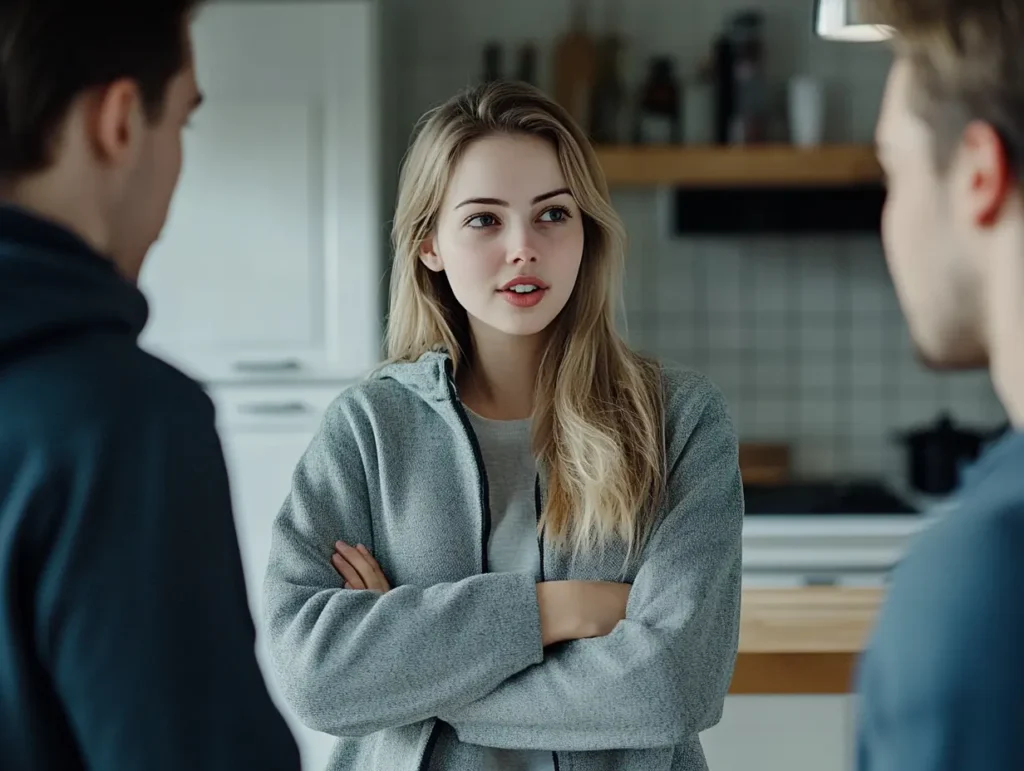
They both laughed. But there was a flicker of curiosity behind their mockery—because they’d never actually seen what was inside after that lock went on. Not once. Claire forced a smile. “You guys enjoy the house.”
She walked off before they could say more. The gravel crunched beneath her boots as she crossed the field toward the barn. The low sun spilled golden light across the boards, illuminating the dust like flecks of gold. Her father had loved this barn. She took a quick look at it before heading back home for the night.
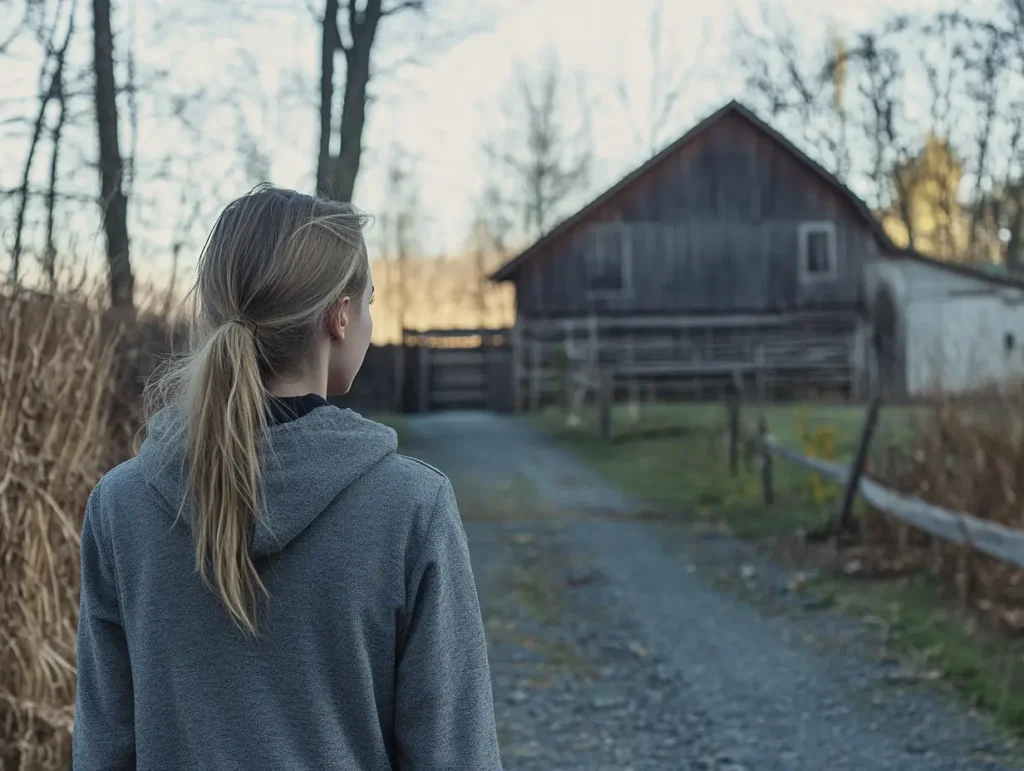
When she was little, he’d hoist her onto his shoulders and pretend they were knights storming a castle. He used to whistle while he worked, stacking hay like pillows. He taught her how to mend fence posts and warm her hands in her pockets when the frost bit hard.
But after she turned sixteen, everything changed. The barn went silent. And so did he—at least about whatever he kept inside. That morning, as Claire headed for the barn, both brothers trailed behind her with folded arms and sideways grins.
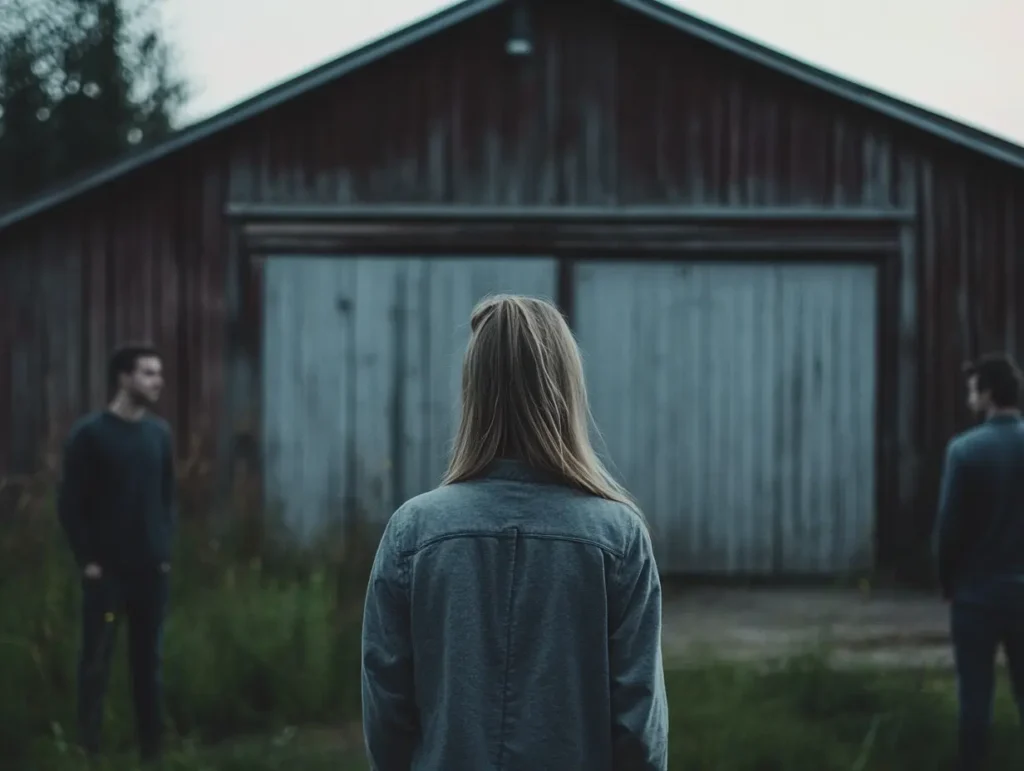
“Finally cracking open the vault?” Sam asked.“Just curious what Dad thought was worth hiding from us,” Bryan added. Claire didn’t reply. She reached for the old latch—where the heavy padlock used to be. It was gone now.
The door creaked open, revealing a sliver of dust-thickened sunlight. The three of them peered inside. Nothing but hay, cobwebs, and forgotten tools. Bryan gave a low whistle. “So much for secrets.” Sam chuckled. “Looks like he saved the best for you.”
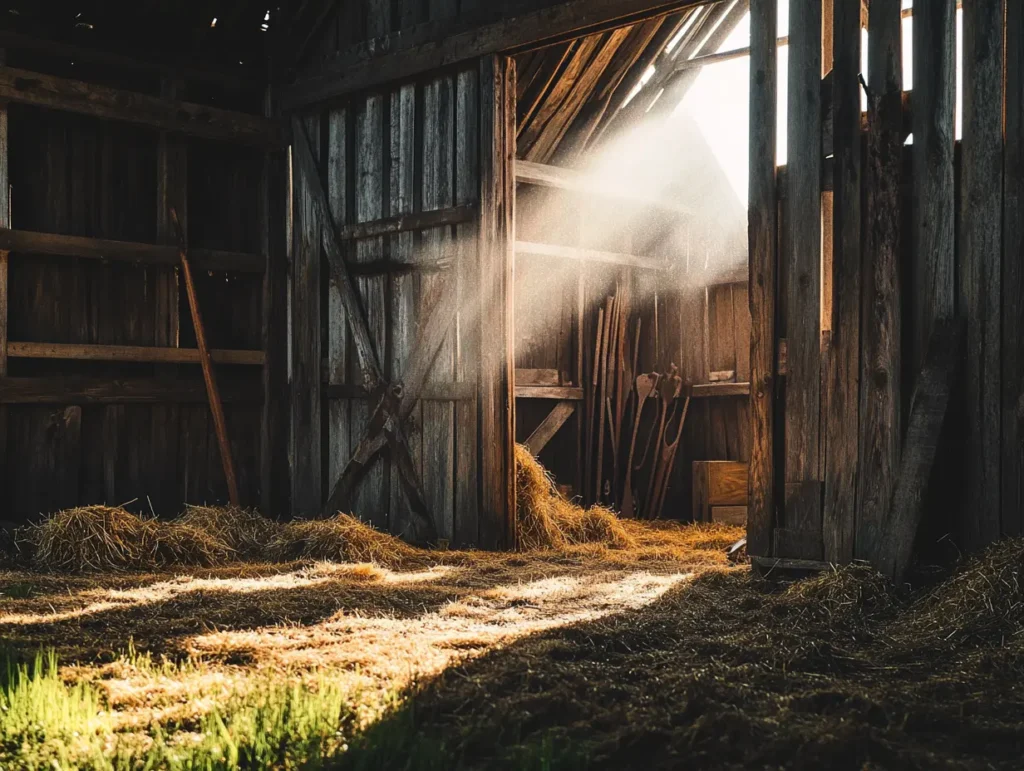
They turned and walked back toward the house, their laughter drifting behind them. Claire stood at the threshold for a moment longer, her fingers brushing the worn wood. “I’ll take care of it,” she whispered. “If this is what you left me… I’ll find a way to make it matter.”
Inside, the shadows waited. Still. Silent. And not quite empty. Claire took a deep breath, rolled up her sleeves, and stepped inside. The barn was worse than she remembered. Cobwebs draped from the beams like faded curtains. Dust blanketed everything—tools, shelves, a rusted wheelbarrow tipped on its side.
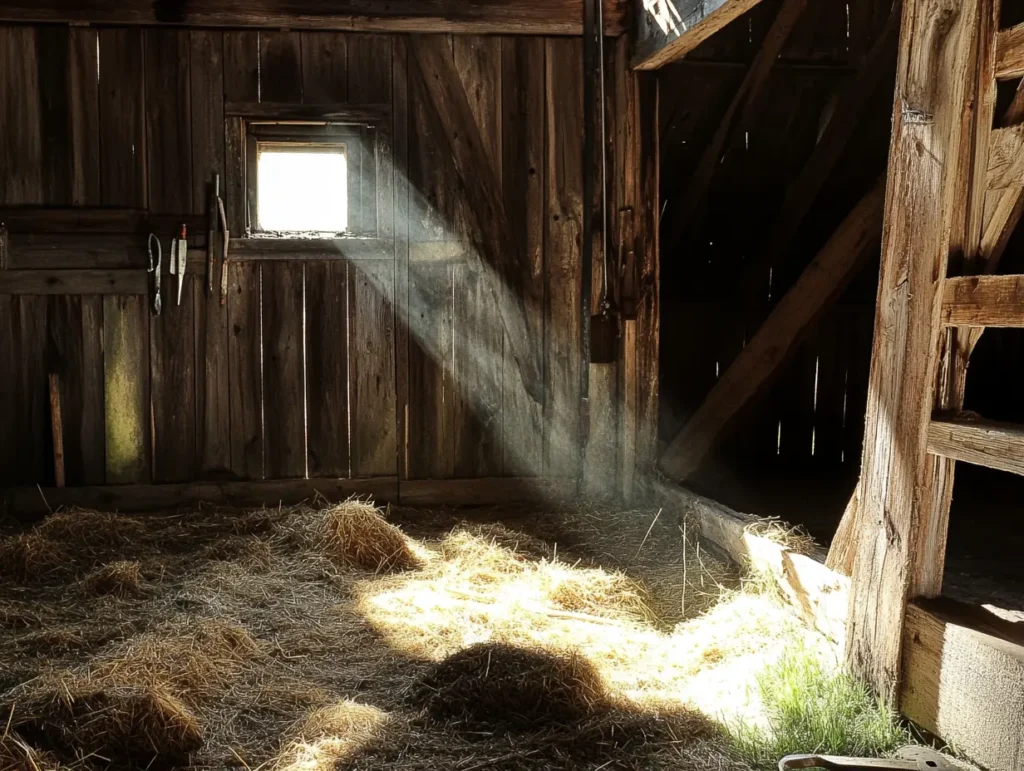
Mouse droppings dotted the corners, and one of the windows had shattered inward, littering the floor with glass and leaves. Claire sighed. “Okay, Dad. Let’s see what you left me.” She found the old push broom behind the feed door and began sweeping, pausing only to cough into her elbow when the air thickened.
Every creak of the floorboards beneath her boots sounded louder now that the animals were gone. The stalls were empty, long since stripped of hay and purpose. Even the worn nameplates—Bessie, Duke, Honey—still hung above the gates, cracked and fading.
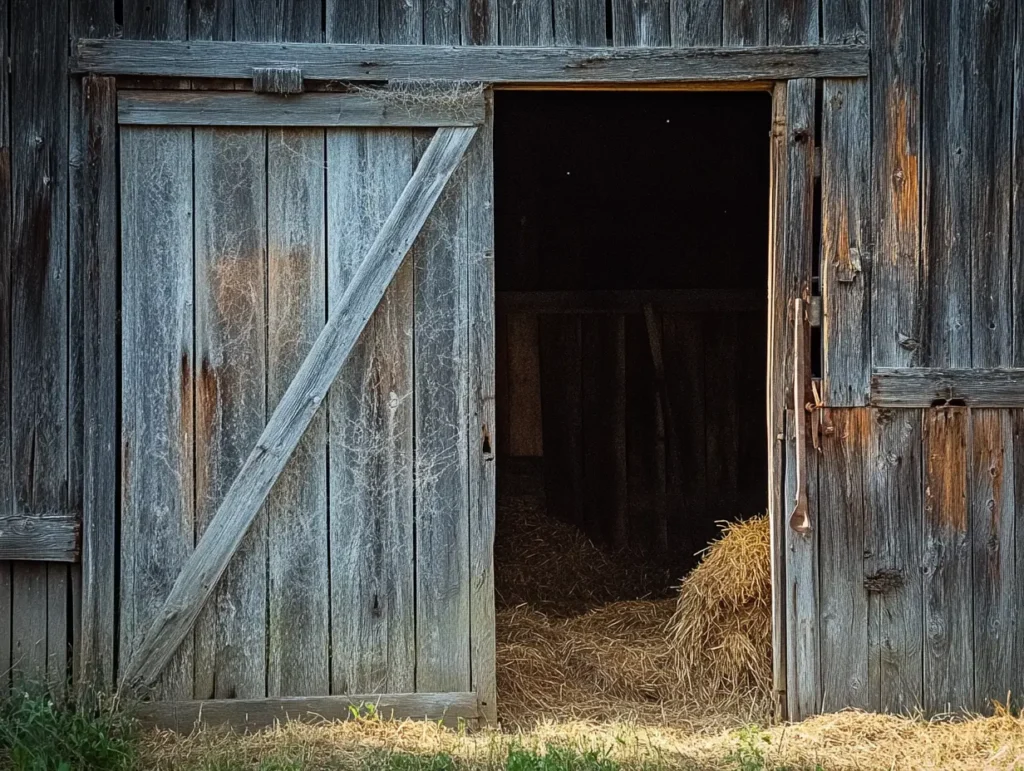
She took her time with each corner. Not because it was necessary. But because it felt like penance. It had been years since she’d been in here, really been in here. She used to help her father muck the stalls and feed the goats.
She’d loved the smell of the barn back then—fresh straw, sweet feed, warm fur. He used to whistle while he worked, and sometimes she’d whistle with him, both of them in tune, out of tune, but never alone. Now the silence pressed in.
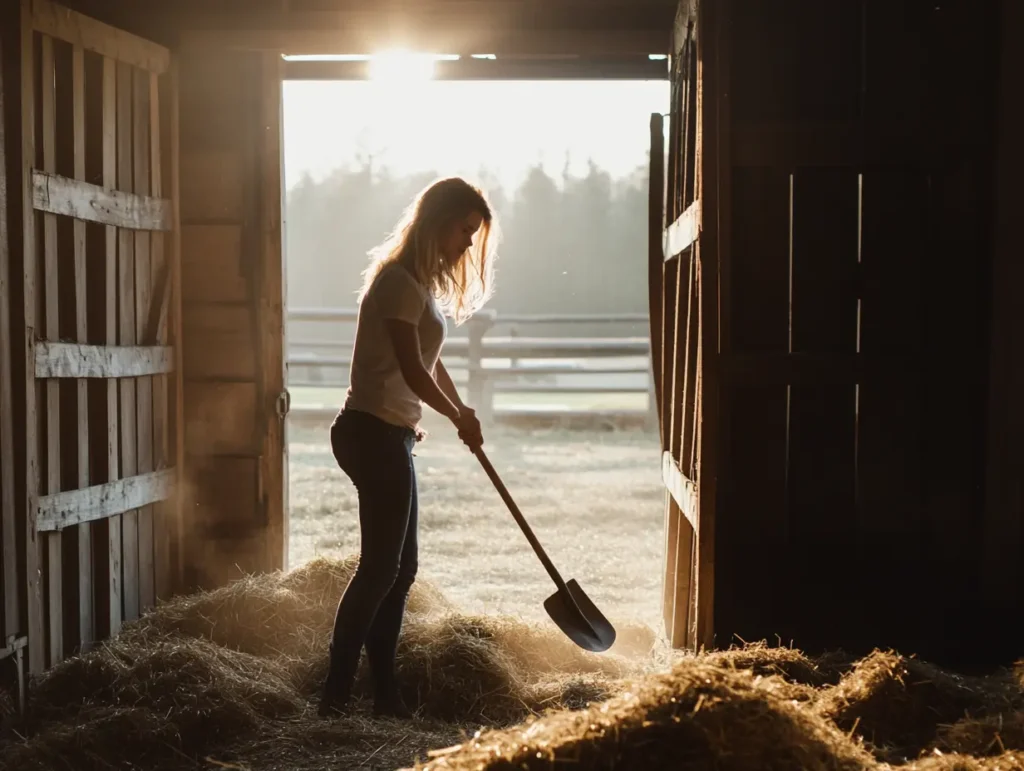
She worked for hours until her arms ached and her back screamed. When she finally stepped outside, her jeans were streaked with dust and her hands were raw through the gloves. The sky had gone gray. Evening was closing in.
Sam and Bryan were still at the house. She knew she shouldn’t go. She went anyway. Inside, they were in the kitchen, sipping drinks and laughing at something on Bryan’s phone. The smell of grilled steak and roasted garlic hit her like a wave.
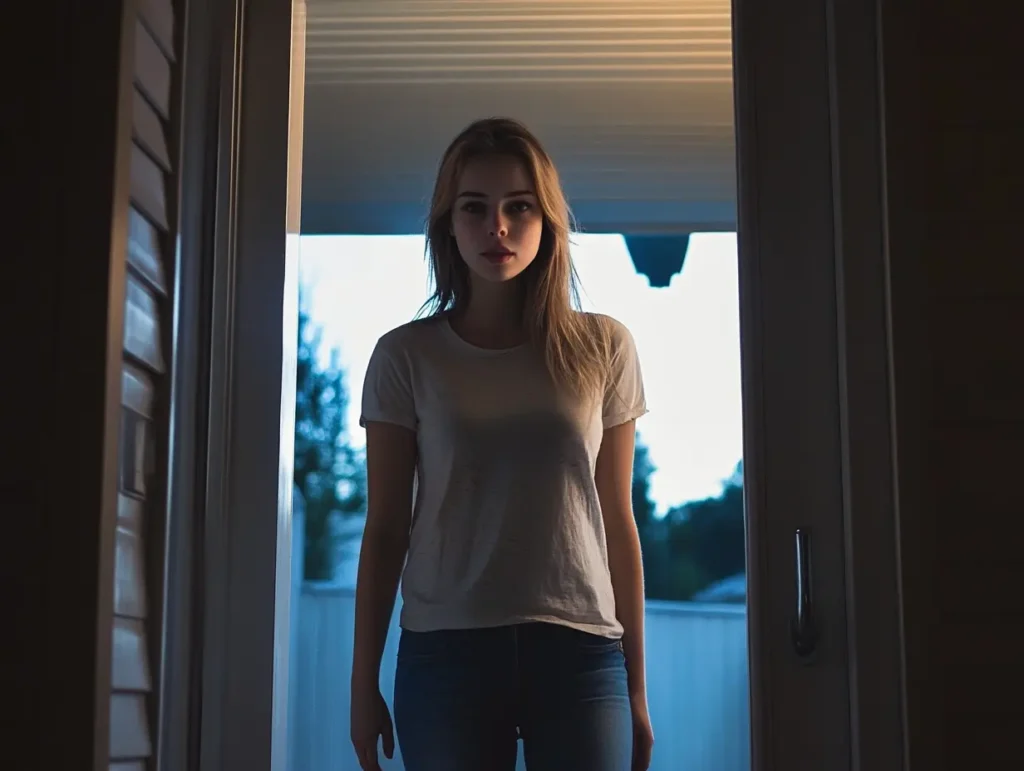
No one had offered her dinner. No one had even called. Bryan glanced up. “Well, look who’s here.” Sam snorted. “Hey Claire, you make any friends in there?” Claire managed a tight smile. “Actually, I’ve been cleaning it out. Trying to make it usable.” “That dump?” Sam laughed. “Good luck trying to make that place look any better.” Bryan raised his glass.
“She should be grateful. Got the whole barn to herself.” Claire’s stomach tightened. She tried to brush it off, but her voice cracked as she said, “I stayed. For over a year. I gave up my job. My life. I’m not asking for anything. But don’t act like I didn’t earn more than dust and splinters.” Bryan shrugged. “You didn’t stay for the money, right? So what does it matter?”

Sam leaned back. “Look around, maybe you’ll find something shiny in there.” The laughter that followed scraped like glass. Claire turned and left without another word. That night, she lay awake in her childhood bedroom, staring at the ceiling fan creaking in slow circles.
Her fists were clenched. Her chest burned. Not because of the inheritance. Not because of the barn. Because they didn’t see her. The next morning, she went back to the barn and pulled open the heavy doors. Her fingers were trembling, but her jaw was set.
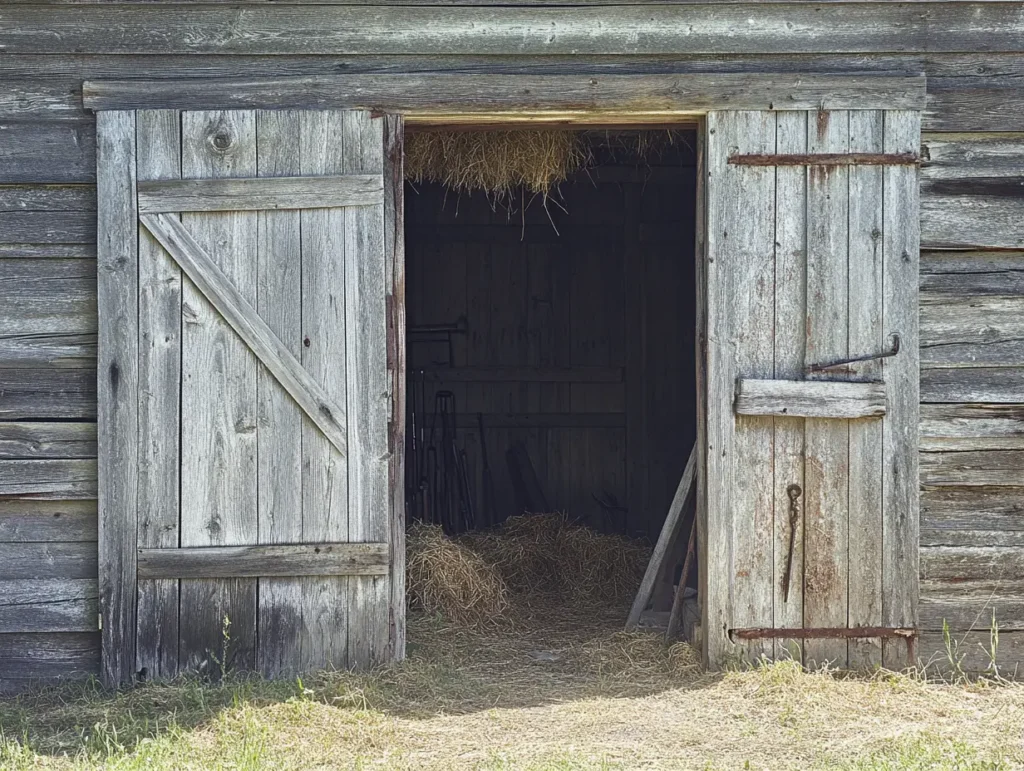
She was done being quiet. She was going to make something of this place. Claire returned to the barn just after sunrise, wrapped in a flannel that still smelled faintly of her father’s aftershave. The morning was cold enough to sting her fingertips, and frost clung to the tall grass outside the barn like the world hadn’t decided whether to let go of winter.
She got to work immediately—sweeping, stacking, and organizing what little was worth keeping. There wasn’t much. A few rusted tools, some broken fencing, and a saddle with a cracked leather strap. Still, it felt good to bring a little order to the place, like she was restoring something sacred, piece by piece.
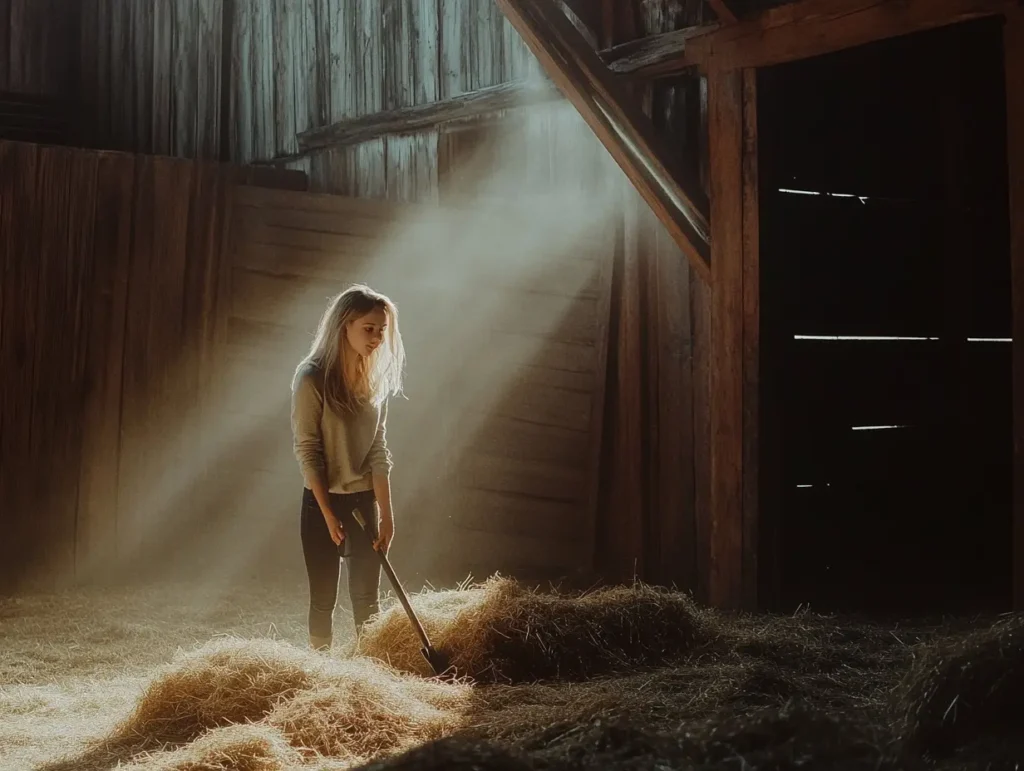
By late morning, she was down to the last pile of hay. It was tucked in the back corner of the barn, behind the old feed bins. The mound had been there for as long as she could remember—left untouched, even when her father was well enough to maintain the rest.
She hesitated, hand hovering above the dusty flakes. Something about it felt… off. Out of place. She sighed and started pulling the hay apart. It was heavier than it looked, clumped and damp in the center. She worked quickly, shaking out her gloves, dust rising around her like smoke.
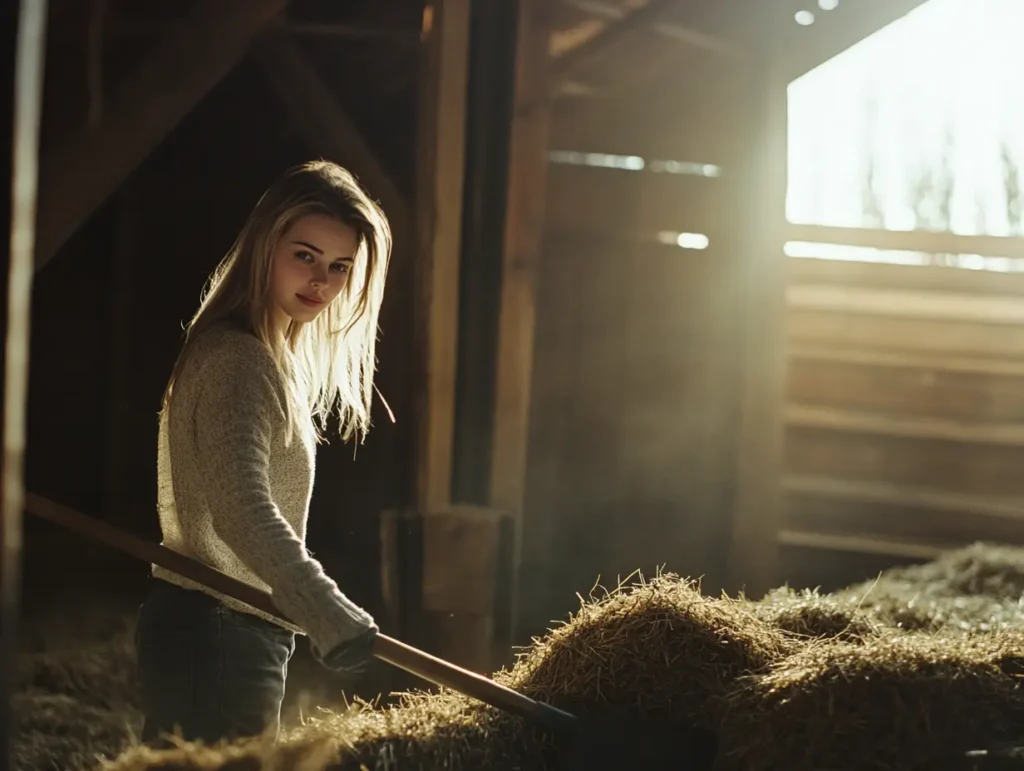
After several minutes of digging, her knuckles scraped something solid. She froze. Then brushed more hay aside. Wood. A plank—old, weather-worn, with a metal ring bolted into the center. A trap door. Her heart jumped.
She crouched, feeling around the edges. It was real. Heavy, sealed tight. No latch. Just the ring. She stared at it for a long moment, suddenly aware of how quiet the barn had become. No wind. No creaks. Just her breath and the soft tick of a nesting bird in the rafters.
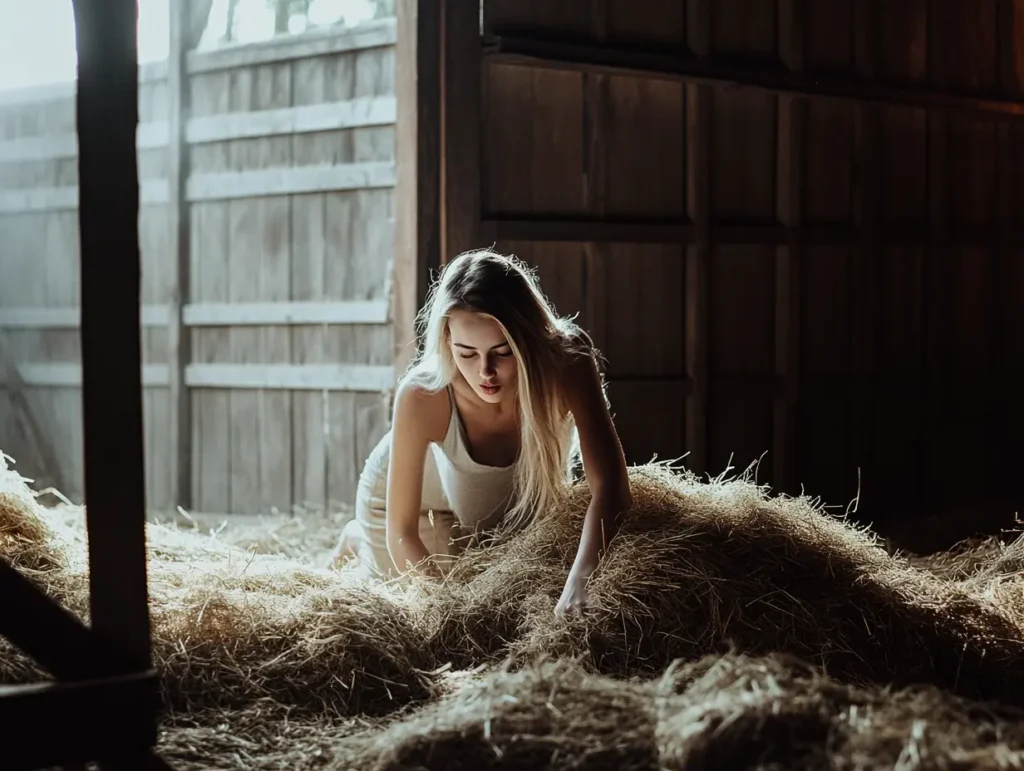
How had she never noticed this? Even as a kid, she’d run back and forth across this floor hundreds of times. Played tag through the stalls. Built forts out of hay bales. This corner had always just been… storage. Her hand tightened on the metal ring. But she let go.
Not yet. She stood slowly and brushed hay off her knees, trying to slow her breathing. Tomorrow. She’d open it tomorrow. That night, she didn’t sleep. She stared at the ceiling again, the same way she had the night after the funeral—except this time, her thoughts spun faster.

What was down there? Why had her father never mentioned it? Was it just storage? Some old root cellar? An old storm shelter he never got around to using? She could still hear Sam’s voice in her head—“Look around, maybe you’ll find something shiny.”
Claire turned onto her side, clutching the pillow tighter. They’d tossed her the barn like it was a leftover. Maybe that’s all it was. But maybe it wasn’t. The next morning, she returned with a flashlight, work gloves, and her father’s old pry bar.
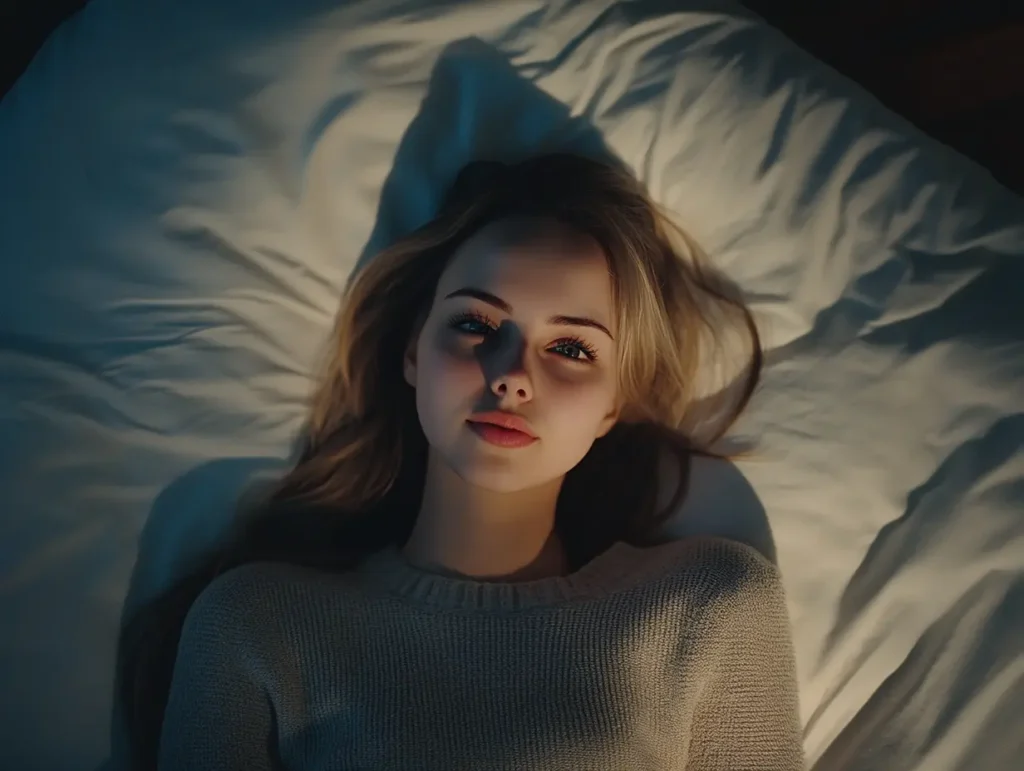
The wood groaned as she stepped back into the barn, the air colder, the silence thicker. She knelt at the edge of the trap door. Wrapped her fingers around the ring. And pulled. The trap door opened with a crack and a heavy groan, like something exhaling for the first time in years.
Claire coughed as dust rose in thick curls. The hinges resisted, metal rasping against wood, but eventually the door gave way and folded back to reveal a narrow staircase. Wooden. Uneven. Fading into darkness. Claire clicked on her flashlight and aimed it down.
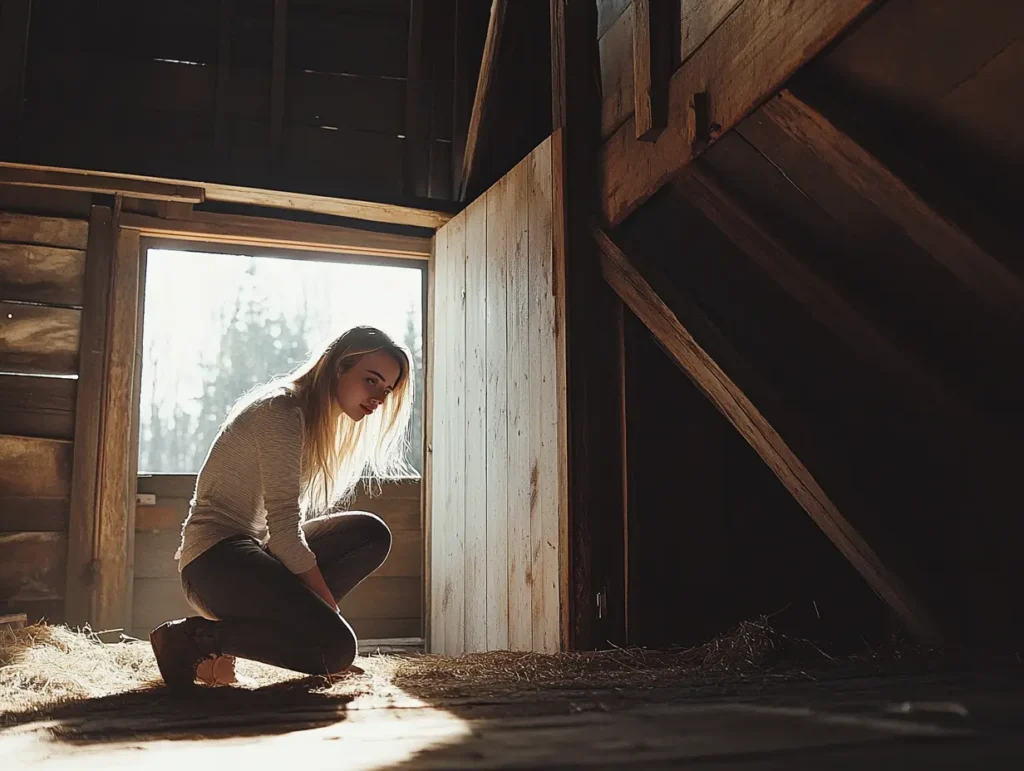
The beam illuminated old steps—some bowed, some cracked—leading into what looked like a cellar, maybe ten or twelve feet down. The air rising from below smelled stale and damp, like wet stone and mildew. She hesitated. But then she descended.
Each step creaked under her weight, but held. At the bottom, her boots landed on packed earth. The walls were lined with rough concrete and wood paneling, patched in places with old tin sheets. The space stretched farther than she’d expected—wider than the barn itself, and colder.
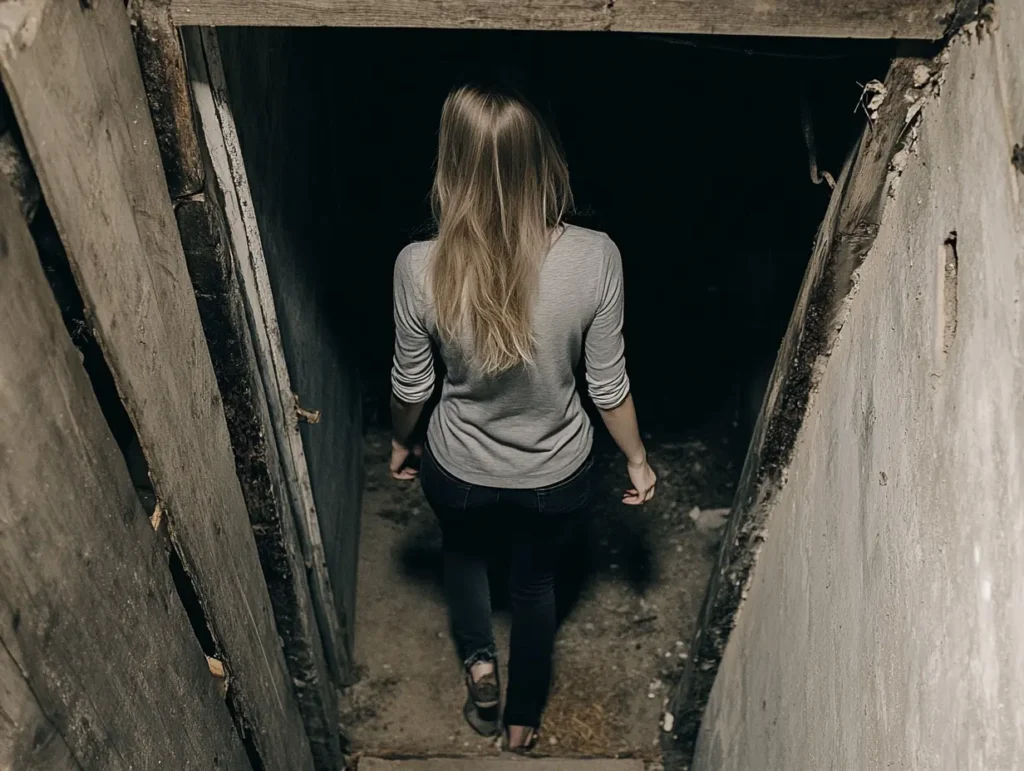
She swept the flashlight slowly across the room. It was cluttered. A worn-out recliner leaned against one wall, missing a leg. A metal filing cabinet stood open, its drawers empty and rusting. Shelves held boxes of loose papers, yellowing newspapers, cracked photo frames.
In the corner sat an ancient fridge—unplugged and duct-taped shut. Cobwebs hung like curtains across everything. And yet… It didn’t feel like a bunker. Or a storm shelter. It felt like… storage. Forgotten storage. Ordinary. Messy. Pointless. Claire exhaled, lowering the flashlight.
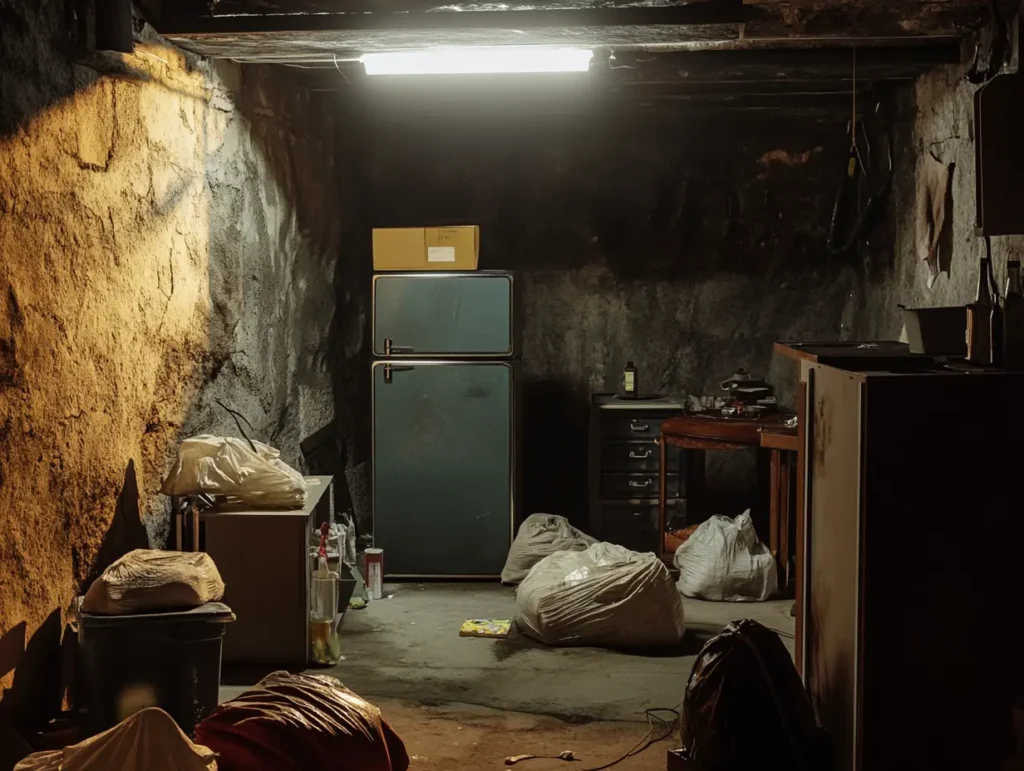
She suddenly felt tired—more than tired. Drained. This was what he left her? This damp basement full of broken furniture and junk? Maybe this was where her father had dumped all the things he didn’t want to deal with. Maybe the barn hadn’t been a gift, just an afterthought.
She turned in a slow circle, light catching on a stack of black trash bags pushed into the far corner. There were maybe seven or eight of them, sagging and leaning against one another, like a pile no one had dared to throw out.
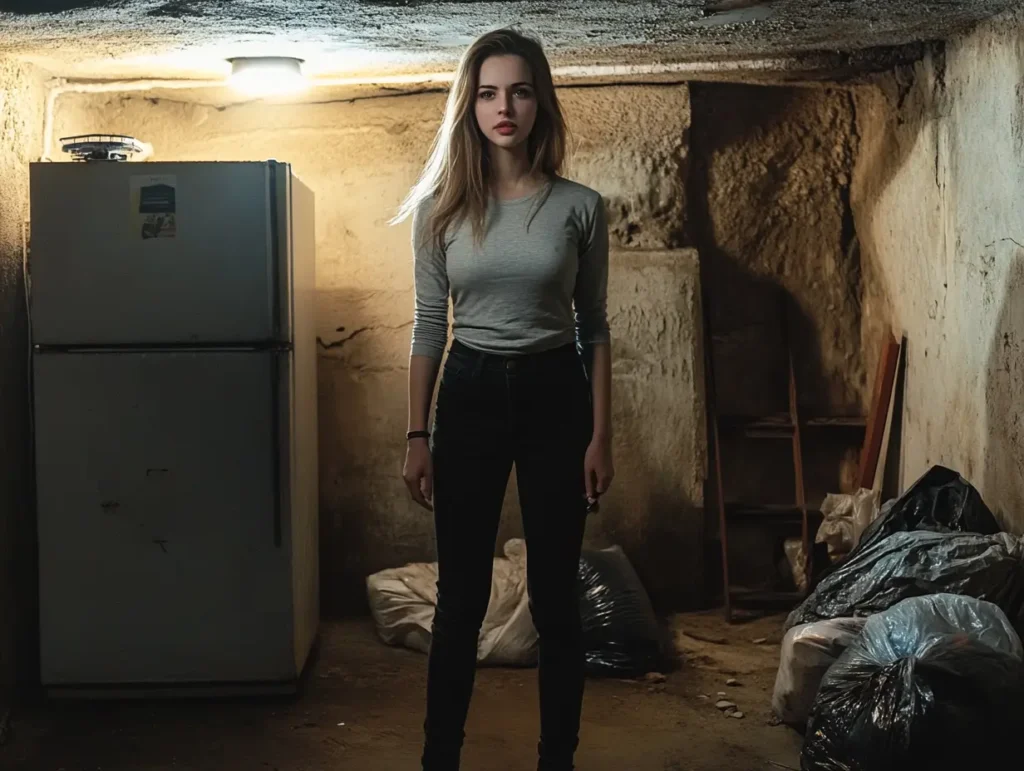
She felt the heat rise in her throat. It was too much. The months she’d spent watching her father fade. The silence from her brothers. The barn. The trap door. The mystery that turned out to be… this. “Usable,” she muttered bitterly. “Right.”
She walked to the nearest trash bag, half-ready to tear into it just for the satisfaction, just to do something. But she didn’t. Not yet. She turned off the flashlight and stood in the dark, letting her eyes adjust. The air was cool and still. Above her, the barn creaked faintly, the trap door now out of sight.
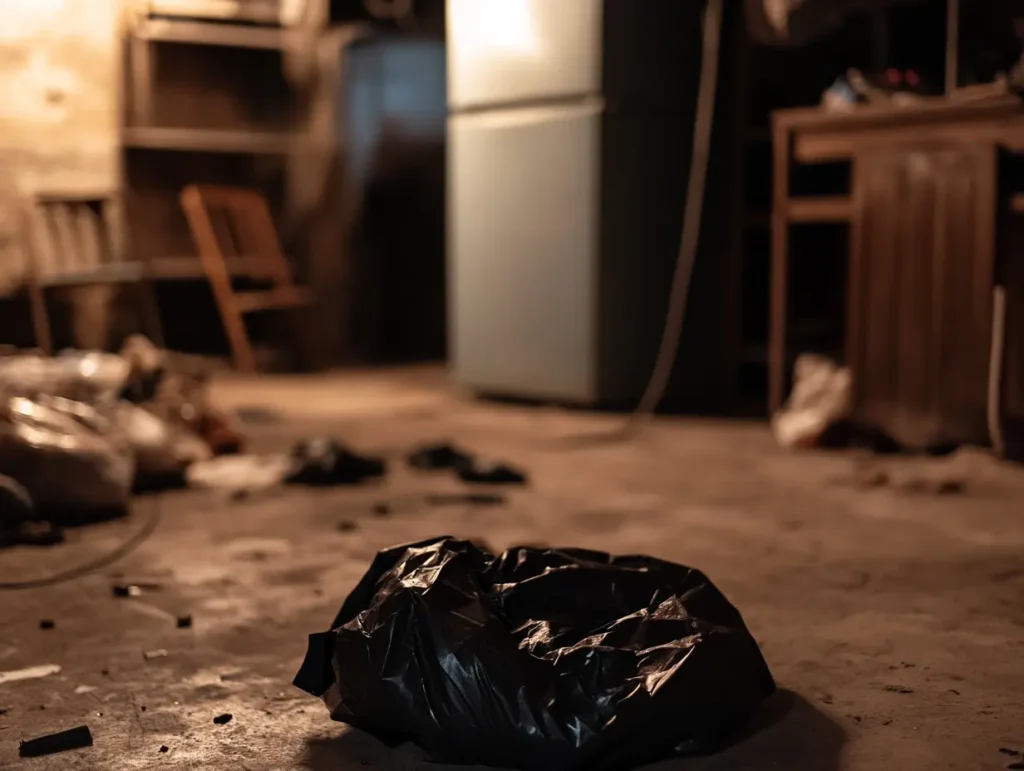
Claire took one last look at the room. There was nothing remarkable here. No treasure. No secret messages. Just junk, piled high and damp. And yet, something tugged at her—something deeper than frustration. Why hide this? Why seal it with a trap door if it didn’t matter?
Her hand brushed one of the trash bags. It crinkled loudly in the quiet. She felt the weight of the barn above her, the sting of her brothers’ laughter still fresh in her memory. Claire narrowed her eyes. Tomorrow. She would go through every single bag. Claire didn’t sleep that night.
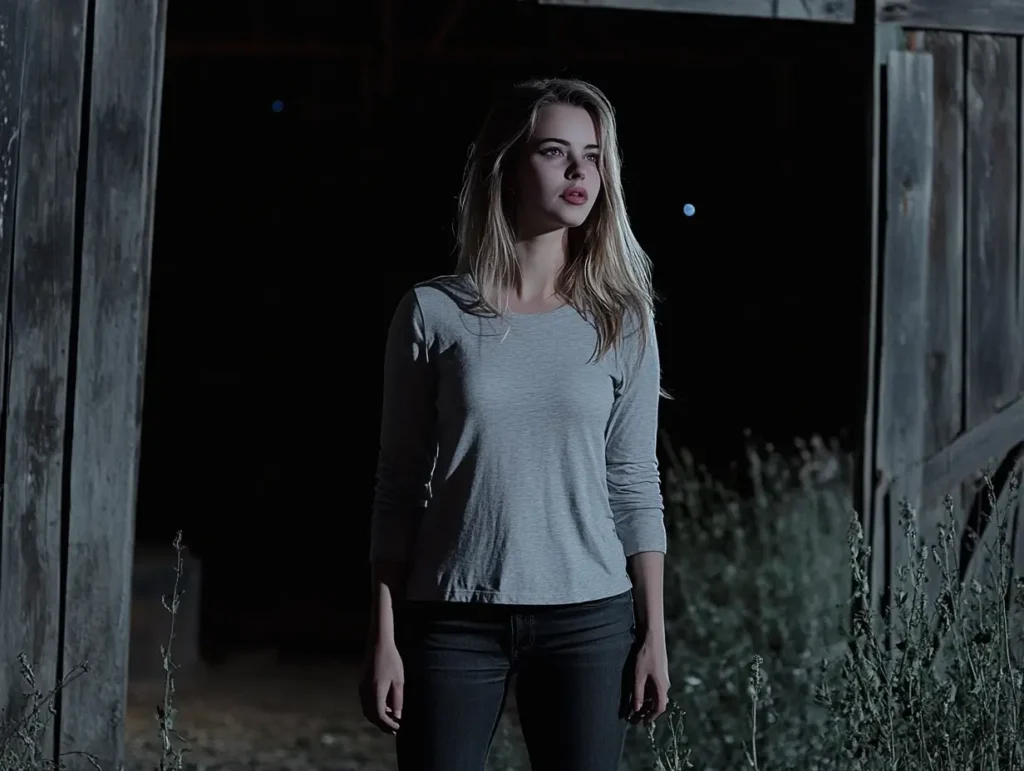
She kept replaying it all—the flicker in her brothers’ eyes, the way Bryan had waved her off like she didn’t matter, the echo of her father’s laugh in that empty barn. She thought she’d made peace with how things were divided, but now?
Now it just felt like they’d thrown her to the dust and dared her to make something of it. So she would. By morning, she was back at the barn, pulling the trap door open again with a yank that startled a crow off the roof. Her flashlight beam cut through the cellar darkness like a blade, and the moment her boots touched earth, she marched straight to the trash bags.
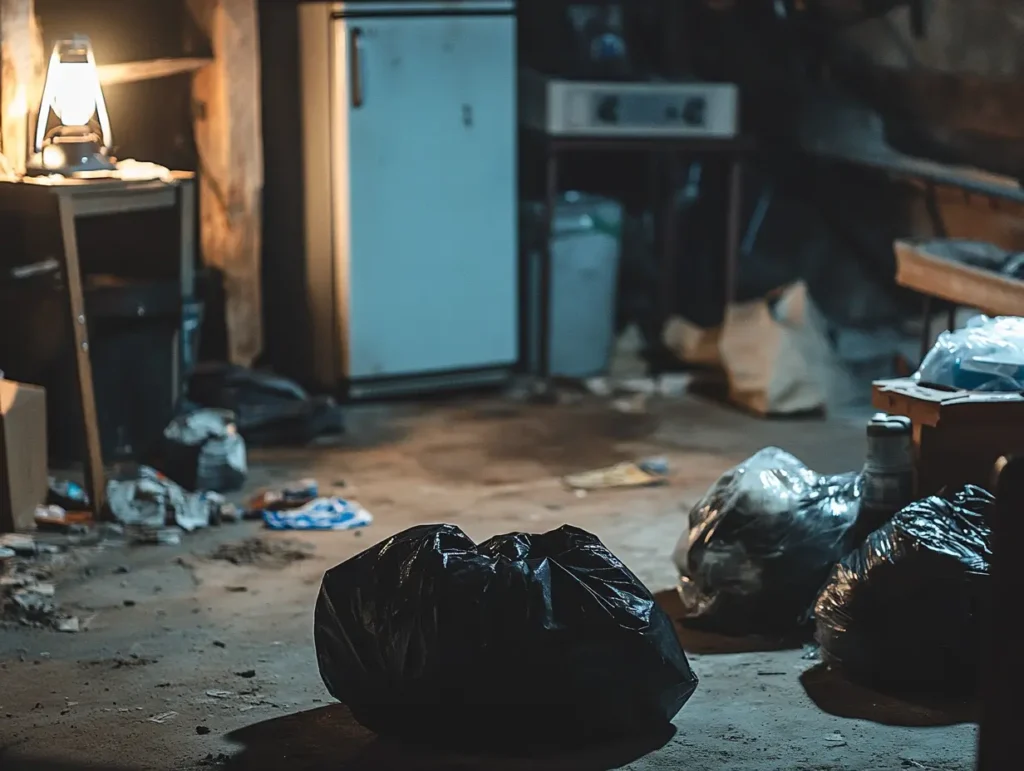
She grabbed the first one—taped shut, heavy—and hauled it out into the open center of the room. She stared at it for a moment, then hissed, “Let’s see what all your crap’s hiding.” She ripped it open. Out spilled a tangle of old clothes, folded bedsheets, and what looked like a child’s wooden toy tractor—scratched and missing wheels.
Her fingers sifted through them, not really knowing what she was looking for. At the bottom, she found a crumpled photograph of her dad holding her as a baby, both of them covered in hay and laughing. She blinked hard. Moved on. The next bag was more of the same: notebooks with pages stuck together, expired canned beans, a broken wall clock still set to 6:13.
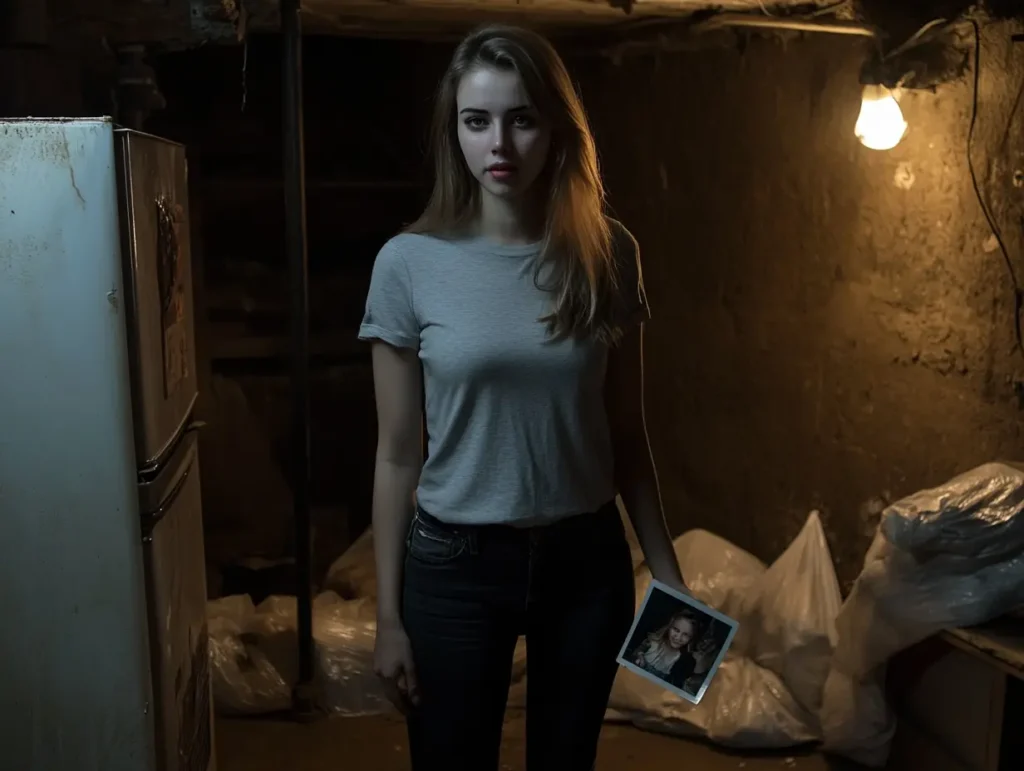
Then came a wine bottle—dusty but intact. She turned it over and smiled bitterly. A 1993 cabernet with a post-it on it: “For a day worth remembering.” The third bag fought her. The plastic stretched and refused to tear, so she picked it up and slammed it against the concrete wall in frustration.
The bottle inside shattered instantly. “Damn it!” she shouted, backing away as red wine bled across the floor like a slow-moving wound. Then she heard it. A soft metallic clink as something rolled. She snapped the flashlight toward it.
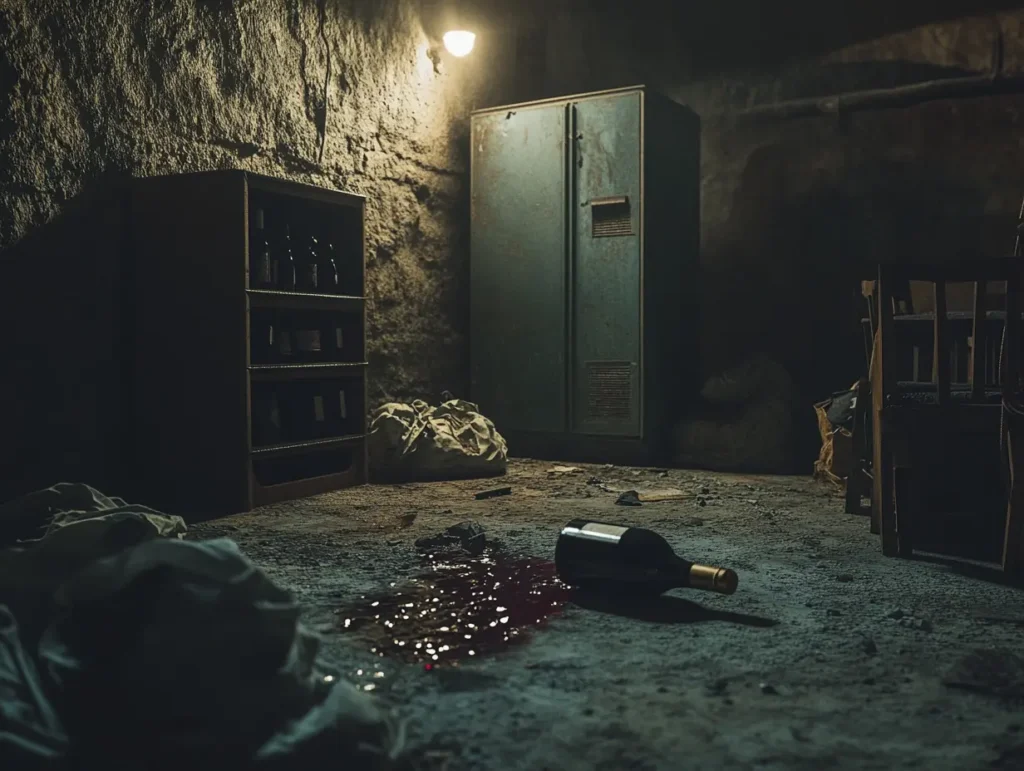
A small brass key had landed near the base of the broken recliner. Claire crouched and picked it up. It was tarnished but unmistakable—an old skeleton key, with a tag tied to it in faded ribbon. She turned it over. Etched into the brass were the initials C.M. Her breath caught.
She looked back at the trash bag she’d just destroyed, then at the others still waiting in the shadows. Her pulse quickened—not with fear, but with the pull of something deeper. This wasn’t junk. This was planted. Claire stood up, clutching the key tight.
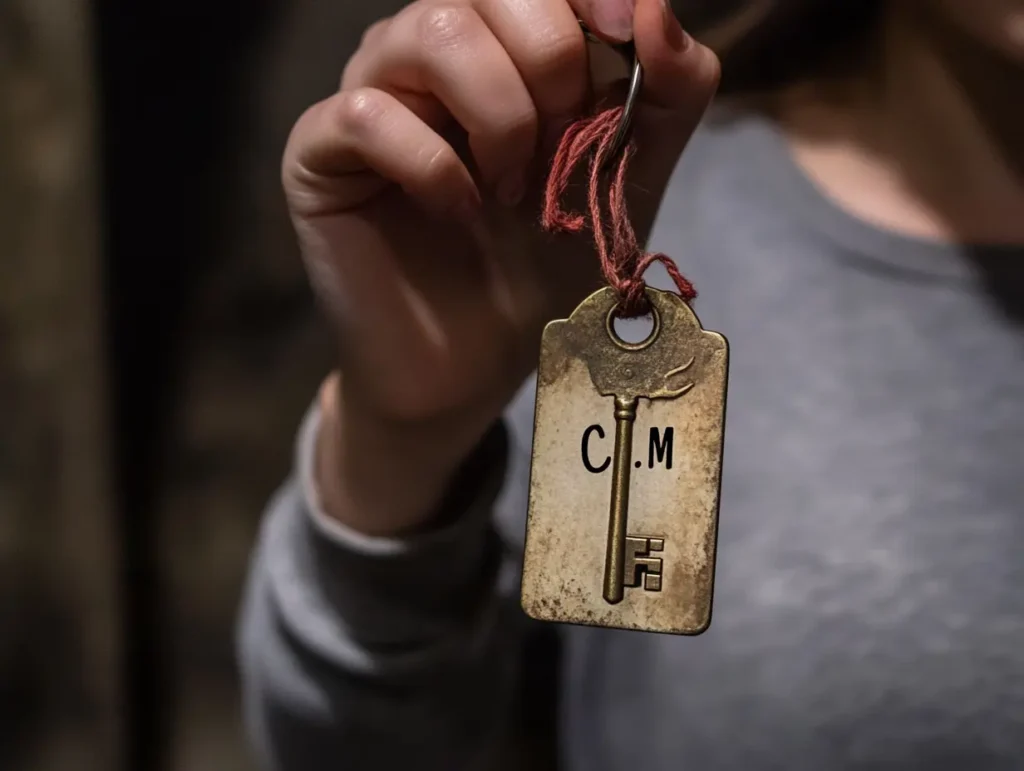
Her hands trembled—not from cold, but from the impossible realization building inside her. There was more here. And whatever it was, her father had wanted her to find it. Claire didn’t waste time.
With the first key tucked safely in her jacket pocket, she went after the remaining bags with the focus of someone peeling back the layers of a secret. Dust swirled, cobwebs clung to her sleeves, and broken glass from the spilled wine crunched under her boots.
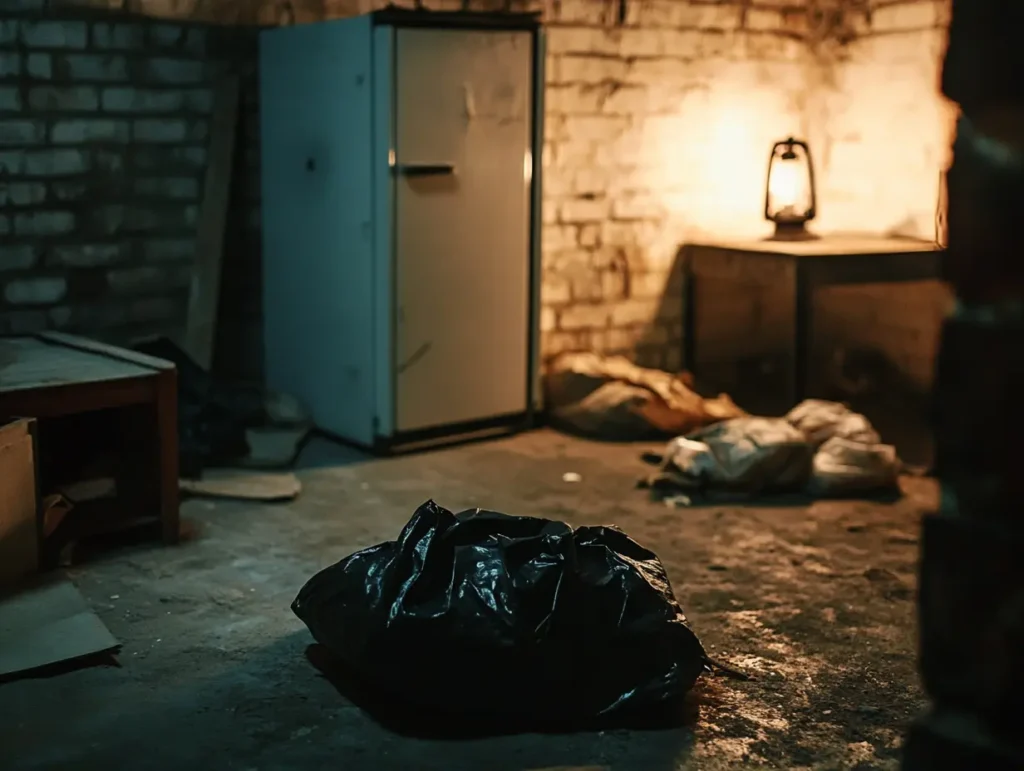
Bag after bag revealed more oddities. Some things felt deliberate—a journal filled with neat entries in her father’s handwriting, most dated decades ago. Others were mundane: cracked dishes, a half-used shaving kit, moldy newspapers.
But every once in a while, she’d find something personal—one of her childhood drawings folded into an old photo album, a ceramic horse from her third birthday. Then, halfway through a bag that smelled strongly of cedar chips, she found it: the second key.
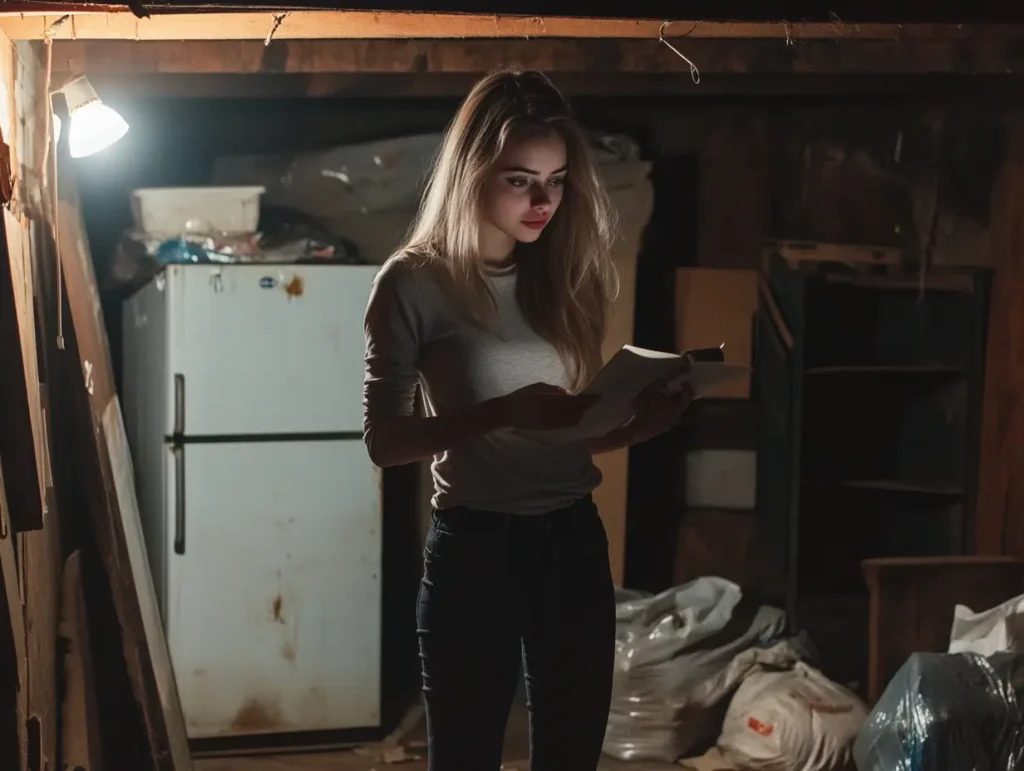
It was tied in a silk handkerchief, the same kind her father used to wear tucked in his blazer pocket on Sundays. This one was silver, smaller than the first, but just as ornate. No initials, but the ribbon it was wrapped in was the same color as the first—deep red, nearly maroon.
Claire sat back on her heels, staring at the two keys laid out in her palm. “What are you trying to tell me, Dad?” she whispered. She turned back to the rest of the cellar. Something nagged at her—the feeling that this wasn’t random. Her father had planned this. He had arranged it.
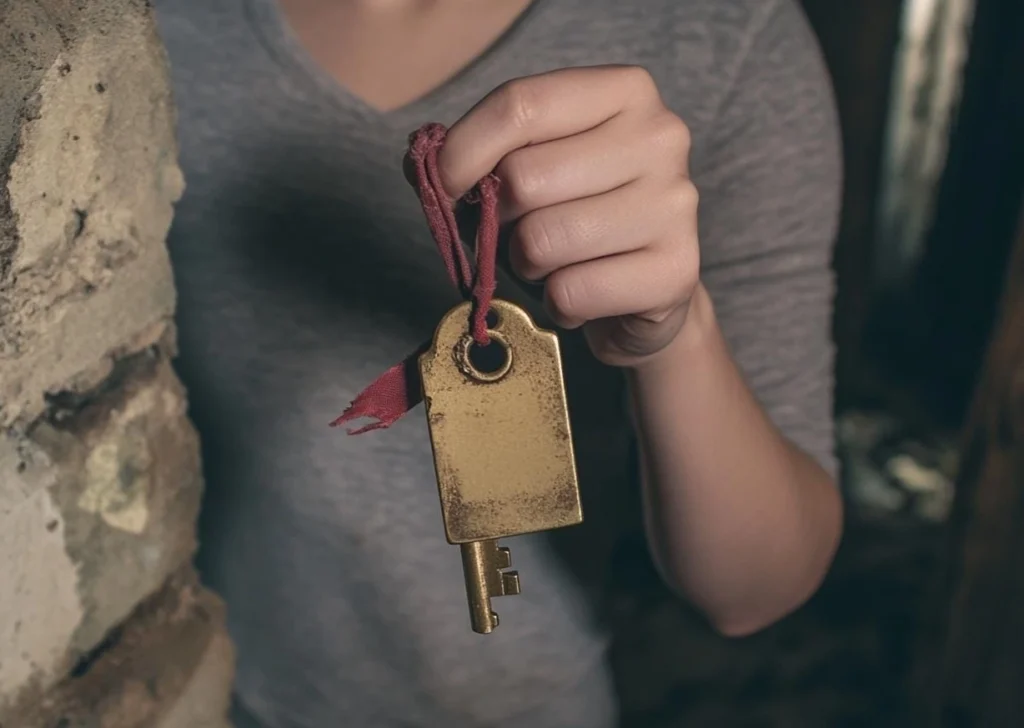
Then her eyes landed on a crooked pile of trash bags pushed up against the far wall. She hadn’t touched those yet. Dragging them aside, she uncovered something strange: a wooden cabinet pushed into the wall, but there was a gap behind it. Claire wedged her shoulder against the cabinet and shoved. It scraped loudly across the concrete floor, revealing a hollow space.
And there it was. A safe. Old and steel, covered in dust, but unmistakably out of place in this cellar of forgotten things. It was set into the wall, and on the front were three keyholes, each with a slightly different shape. Claire dropped to her knees.
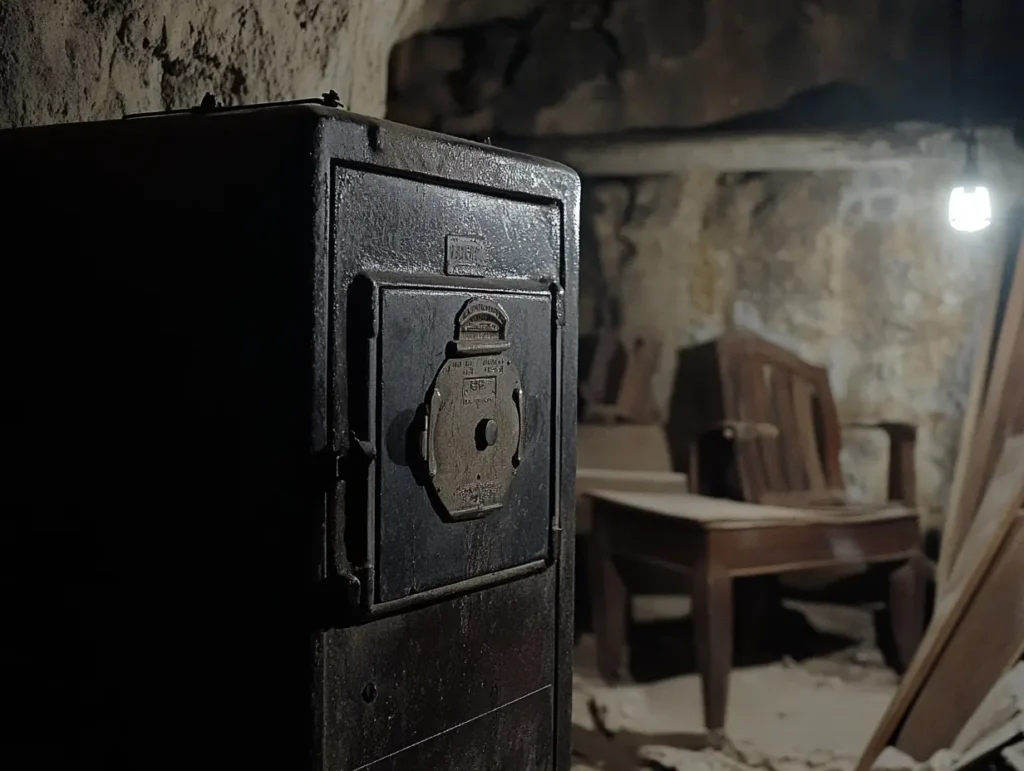
Her heart thundered in her ears. Her fingers trembled as she inserted the first key into the largest hole. It turned with a satisfying click. She inserted the second key—click. Then… nothing. Two down. One to go.
She stared at the last keyhole, heart pounding with a mix of disbelief and anticipation. If this was what it looked like, then her father hadn’t left her nothing. He had left her something only she could find. Claire stood slowly and looked at the bags that remained—three, maybe four at most. She wasn’t tired anymore. She wasn’t angry.
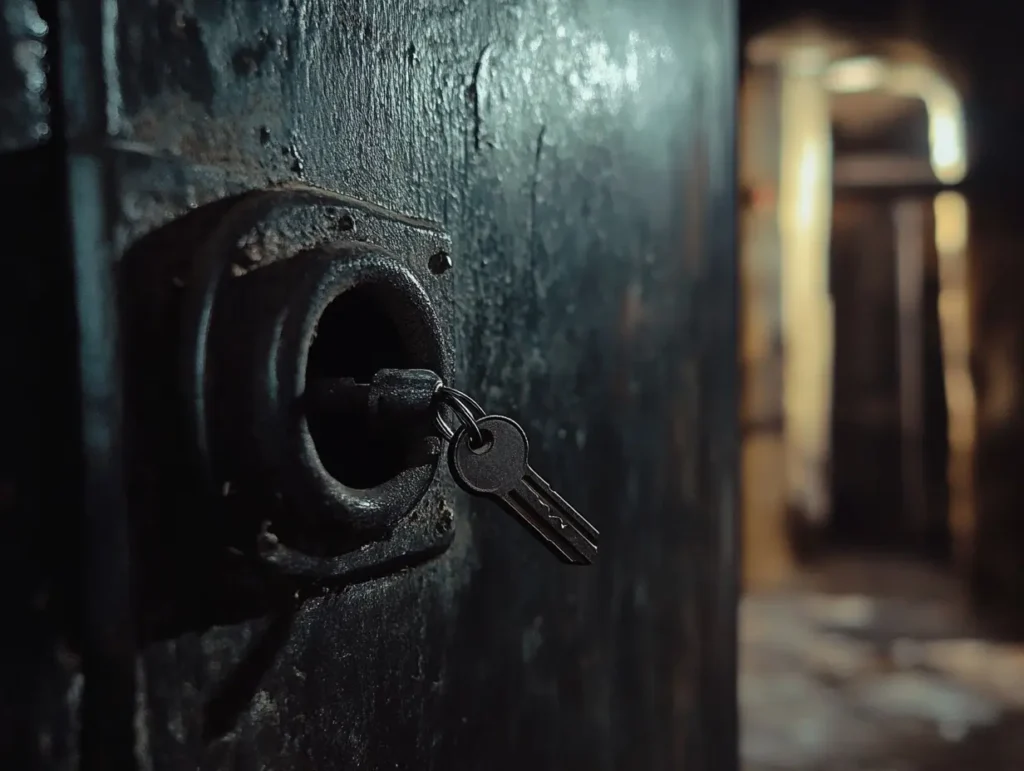
She was close. And whatever waited inside that safe wasn’t just an inheritance. It was a message. The third key didn’t come easily. The first bag she opened was filled with shredded magazines and moldy blankets. The next had a pair of broken lamps tangled in extension cords.
Claire rifled through each one, her pulse ticking like a clock in her throat. In the second-to-last bag, beneath a stack of warped vinyl records and an old jacket, she found it. The third key. It was the smallest of the three—brass, slightly tarnished, tied with the same deep red ribbon.
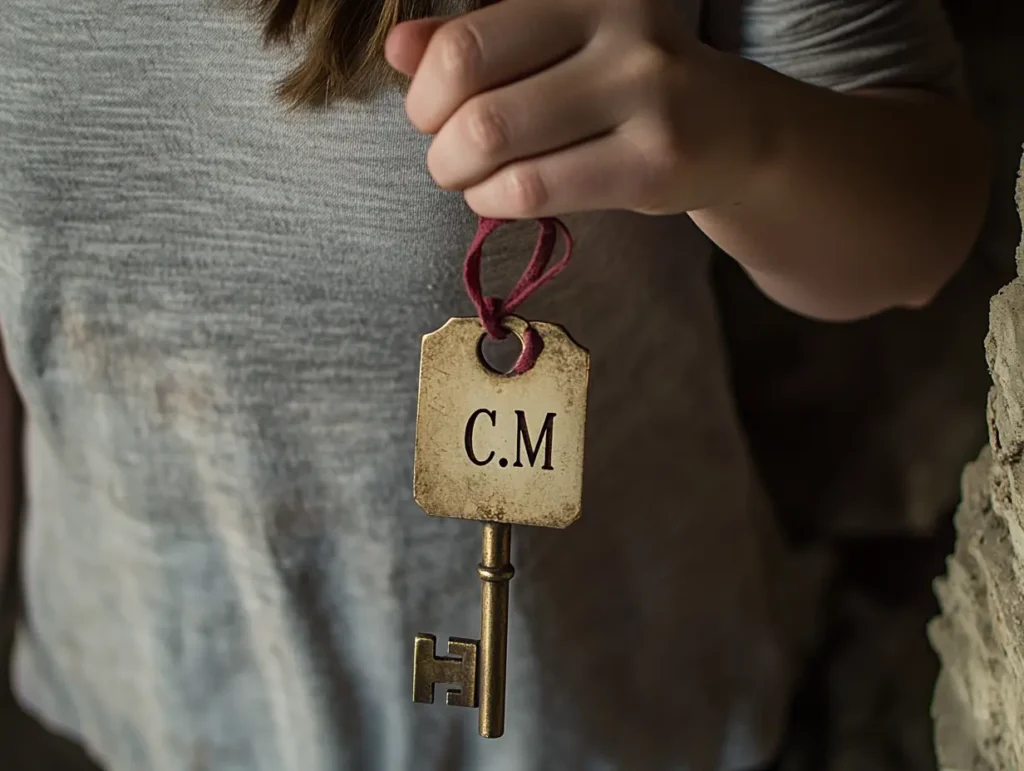
Claire held it up to the flickering cellar light, feeling the weight of the moment settle on her shoulders. Her fingers curled tight around the set as she turned back to the safe. The first key turned easily again. So did the second. Then came the third. Click.
The mechanism inside shifted with a deep mechanical thunk that echoed through the cellar like a heartbeat. Claire stepped back instinctively. Dust shook from the top of the safe as the door creaked open. She reached in. At first, she thought it was empty.
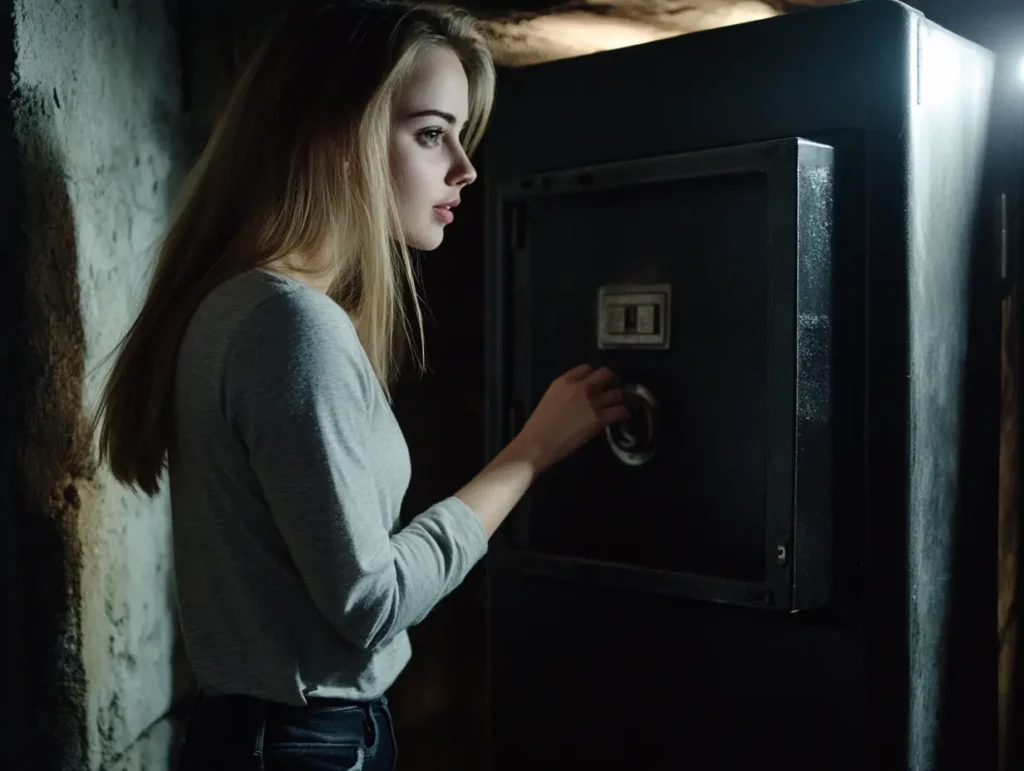
Then she saw the envelope, sealed with wax bearing the faint imprint of her father’s signet ring. Underneath it—neatly stacked bills, gold coins, old jewelry, and a single velvet pouch that jingled softly when lifted. There were passports, old deeds, and a bank ledger tucked behind it all.
But Claire didn’t care about any of that—not yet. She opened the envelope. Inside was a handwritten letter on thick, yellowing paper. Her father’s script, firm and slanted: “Cupcake, If you’re reading this, then you didn’t give up.”
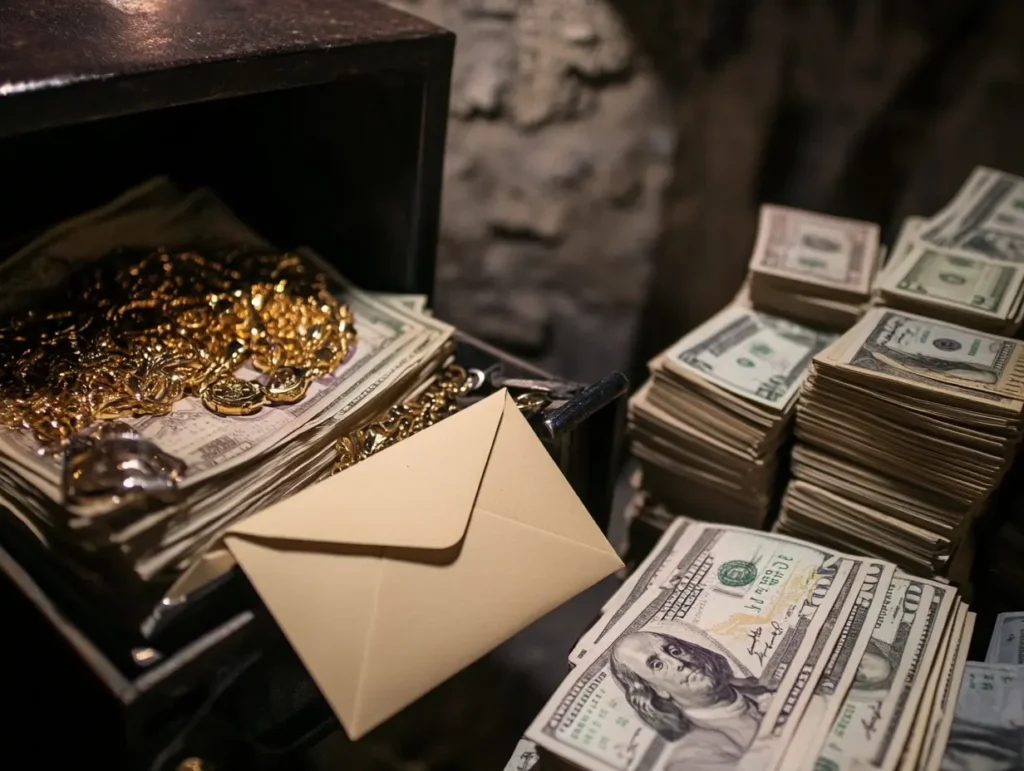
“You never did, even as a kid—you kept digging until your hands were raw and your heart was certain. I always loved that about you. I didn’t leave you the barn because I thought it was worthless. I left it because it was ours. Because I knew you’d see past the dust and decay. Because I knew you’d remember.”
“And because I wanted you to have one last adventure with me. Everything in here is yours. Not because you earned it, though you did. But because you were the one who stayed. The one who saw me through the end. The one I trusted to understand this the most. You were always my wild one. My curious one. My heart. Love, Dad.”
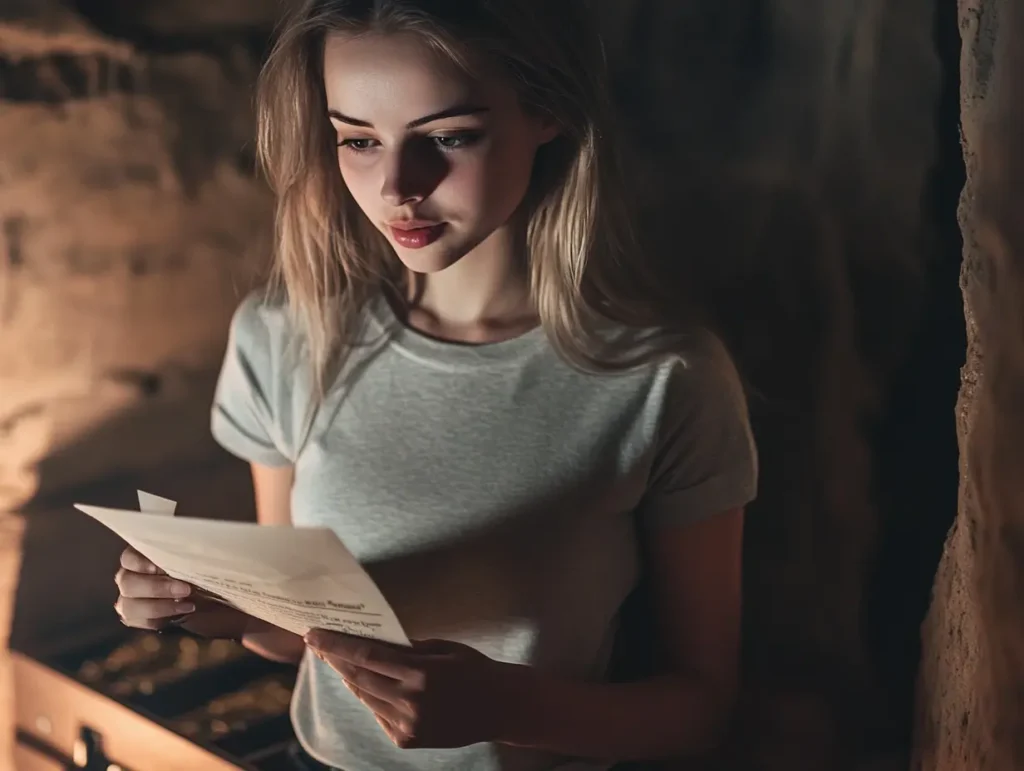
Claire pressed the letter to her chest. She didn’t cry right away. She just sat there for a long time, in the silence of the cellar, surrounded by broken memories and newfound treasure, feeling her father’s love in every dusty corner.
She smiled—softly, quietly—through a trembling breath. He hadn’t forgotten. He had seen her all along. Claire didn’t rush to tell her brothers. She didn’t storm into the house waving gold bars or waving the letter like a trophy.
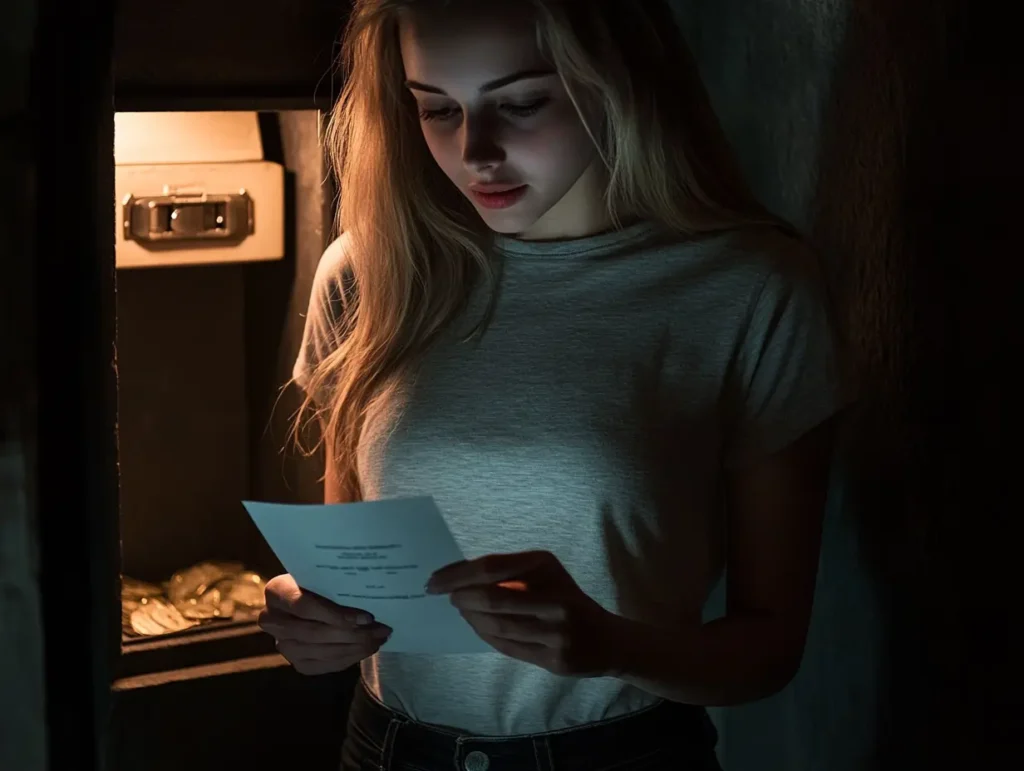
She just quietly locked the cellar, cleaned the barn until sunset, and left with dust on her hands and something lighter in her chest. That night, she sat at the kitchen table of the empty farmhouse, her father’s letter beside a mug of tea gone cold.
She read it again, mouthing the words in the silence, letting each one land deeper than the last. He knew. He knew what they didn’t. What they refused to see. And now she did too. The next morning, when Bryan made another snide comment about “living the barn life,” Claire didn’t flinch. She didn’t rise to it. She just looked at him and smiled.
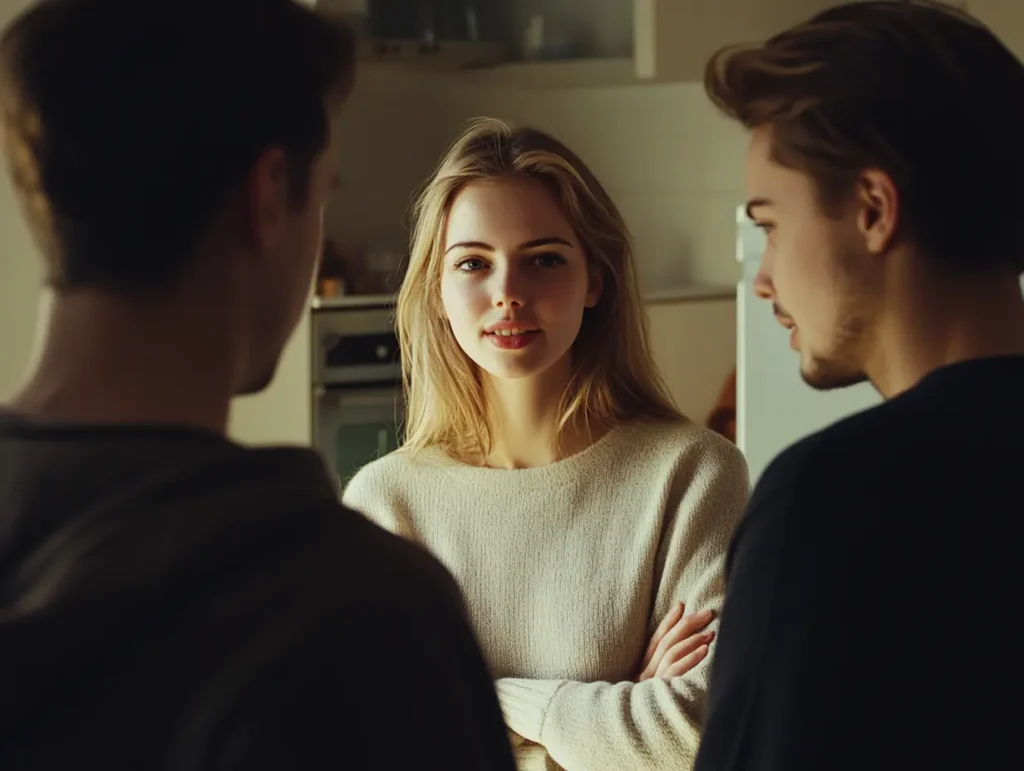
Not smug. Not bitter. Peaceful. She didn’t need to prove anything anymore. Instead, she went back to the barn and got to work—not cleaning this time, but rebuilding. She opened the windows. Swept the dust into neat piles.
Brought in flowers from the yard and set them in empty mason jars. Bit by bit, the place transformed—not into a home, or a monument, but a haven. Hers. Weeks later, after the will was long settled and the arguments died down, Claire met with a quiet real estate agent in town.
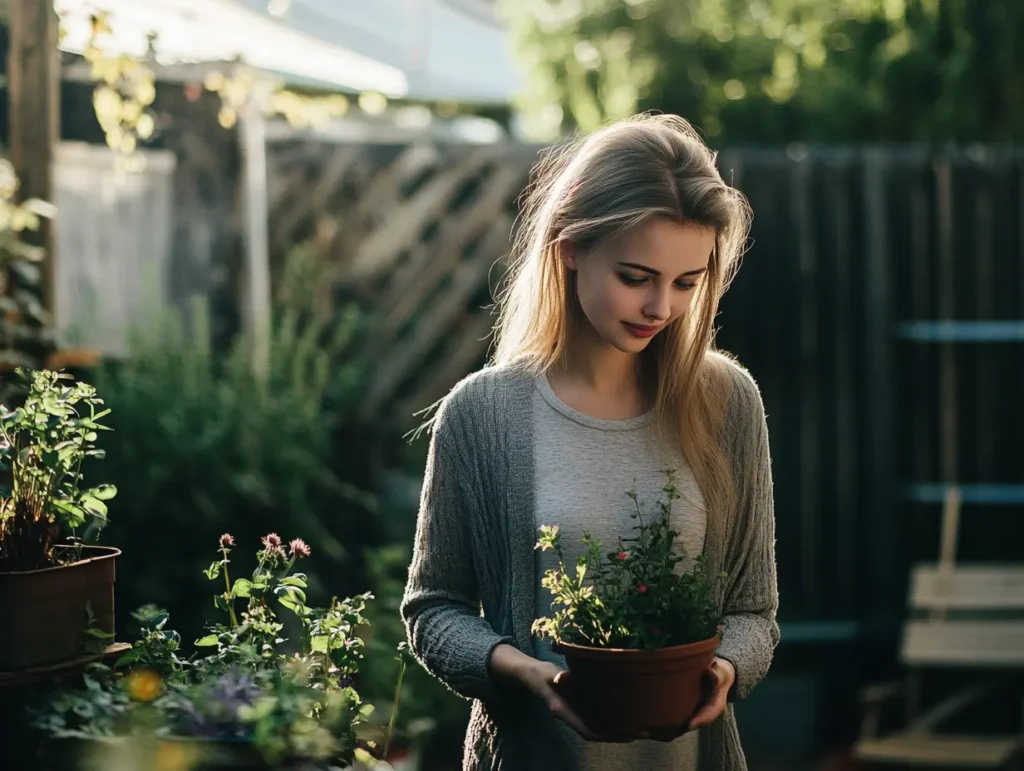
She handed him a list of local charities, small farms, and one family down the road who’d lost everything the year before. She kept just enough of her inheritance to start something small: a flower and herb garden in the empty plot behind the barn.
The rest, she gave away in her father’s name. Sam and Bryan never knew. She didn’t need them to. They’d gotten what they wanted. So had she. Late one afternoon, as she watered the first row of wildflowers blooming against the fence, she thought of her father—his boots thudding across the barn floor, his whistle echoing through the rafters.

And for the first time in months, she didn’t ache when she remembered him. She smiled. “I found it, Dad,” she whispered, brushing the soil from her palms. “Thanks for everything.” The wind picked up. The sun slipped behind the trees. And in the quiet rustle of the leaves, she almost heard him whistle back.
